- 1300 360 164


Vaccinations for Morocco
Health risks disclaimer.
The following information is intended as a guide only and is not intended to replace professional medical advice.
We, at Sonic HealthPlus, trading as Travelvax and our related companies, cannot guarantee that the following information is complete, up-to-date, accurate or error free. You therefore view the following information at your own risk.
You should obtain specific travel health advice in relation to your individual needs and your intended travel, including advice on vaccinations, anti-malarial and other medications based on your past vaccination history, your present medical condition and your intended itinerary.
Our staff at travelvax.com.au are trained in the medical travel health area and are able to advise you on your specific individual needs. Please feel free to contact us on 1300 360 164 for assistance.
To continue you must accept this disclaimer by clicking the button below.
About Morocco Vaccinations
Situated in Africa’s northwest corner, Morocco is bounded by the Mediterranean Sea, the Atlantic Ocean, and Algeria. A generally fertile coastal area and desert hinterlands is separated by mountain ranges (elevation to 4,165m). Coastal temperatures are mild from November to May, much hotter during summer. In mountainous areas temperatures range from 4-32°C.
Travel Health Alerts
Global: extreme heat and medication advice, measles spreading, measles alert, counterfeit wine causes deaths, vaccine preventable diseases, yellow fever.
No certificate required and no risk to travellers.
Other country requirement(s) (2022)
Proof of vaccination against poliomyelitis, documented in the International Certificate of Vaccination or Prophylaxis and certifying the administration of one dose of vaccine within the previous 12 months and at least 4 weeks prior to departure, for all travellers arriving from poliomyelitis-affected countries.
Travelvax has doctors who are yellow fever vaccination-accredited. Click here to learn more about Yellow Fever.
For the most up to date requirements for entry into Australia, go to Smartraveller .
Please click this COVID-19 Travel Regulations Map (IATA) to view the latest Morocco COVID travel requirements.
Hepatitis A
Moderate risk to travellers, vaccination recommended. Click here to learn more about the Hepatitis A vaccination.
Hepatitis B
Low presence of Hepatitis B in local population, discuss whether vaccination would be recommended with a medical practitioner . Vaccination is recommended for specific high-risk travellers (sport/adventure/occupational/sexual). Consult a medical practitioner for your specific risk. Click here to learn more about the Hepatitis B vaccination.
Moderate risk for most travellers. Vaccination recommended for travel to smaller cities, villages and rural areas outside usual tourist routes. Some medical conditions pre-dispose to infection; whether vaccinations would be recommended should be discussed with a medical practitioner. Consult a medical practitioner for your specific risk. To learn more about Typhoid and the available vaccinations, click here .
Northern hemisphere winter risk (November to April). Most common vaccine preventable illness in travellers. Vaccine recommended, effective for 1 year. To learn more about the Influenza virus, click here .
Disease present. Recommendation for vaccination will depend on specific itinerary and activities planned. Generally rabies vaccination is advised for high risk individuals such as veterinarians or animal handlers, cavers. Additionally for higher risk travellers who plan: extended periods outdoors, rural travel, adventurous activities including bicycling; also expats or long-term travellers to endemic regions and children (risk of more severe or risk-prone bites and may not report contact at all). Click here to learn more about rabies.
Japanese Encephalitis
No risk to travellers.
Other country requirement(s) (2022): Proof of vaccination against poliomyelitis, documented in the International Certificate of Vaccination or Prophylaxis and certifying the administration of one dose of vaccine within the previous 12 months and at least 4 weeks prior to departure, for all travellers arriving from poliomyelitis-affected countries.
Tickborne Encephalitis
Meningococcal meningitis.
Low risk to travellers.
Other Diseases
Travellers diarrhoea.
Moderate risk. Travellers' Diarrhoea affects 20-60% of overseas travellers, food and water precautions are essential. Self-treatment medications may be recommended. Click here to learn more about the common symptoms and ways to prevent getting Travellers' Diarrhoea.
Insect-borne Diseases
Diseases such as Dengue , Chikungunya , Zika may be present. Seasonal risk will vary by country. Whether preventive measures will be recommended will depend on itinerary, length of stay, type of travel etc. and needs to be discussed with a medical practitioner. For those countries with disease present, risk is highest in urban and semi-urban areas, but may also occur in rural areas; insect avoidance measures are highly recommended all year round. Travelvax believes that the best defence is to understand their habits, dress properly and use an effective insect repellent in the correct manner. Consult a medical practitioner for your specific risk.
Schistosomiasis
Swimming or bathing in freshwater is the main cause of infection. Avoid freshwater contact if you are unsure of origin. Learn more about Schistosomiasis here .
Sexually transmitted and blood-borne diseases occur. The risk to travellers can be greatly reduced by practising safe sex with any new partner. All travellers should carry condoms. Blood borne diseases (HIV, Hepatitis B & C) can be spread by blood transfusion, tattooing, body piercing or non-sterile needles. Travellers in high risk groups should carry sterile needles (see also Medical Care). Understand the symptoms and how to prevent STIs here .
Altitude illness is a risk to travellers ascending higher than 2000 meters. Preventative medication is available. Consult a medical practitioner if ascending to 2000 metres or above. Click here to learn more about Altitude illness.
Additional Information
Personal safety.
In order to check before and during travel for any high-risk areas visit the Smartraveller website. Avoid unnecessary displays of wealth or valuables and minimise the amounts of cash carried. Keep secure records of passport/credit card/licence numbers. For more safety tips visit: www.smartraveller.gov.au .
Medical Care
Limited medical facilities available. Unless travelling with a well-equipped organisation, a high level of self-sufficiency in terms of first aid kits and sterile equipment is recommended. An evacuation contingency should be a part of your travel insurance. Check for any contacts supplied by your emergency assistance organisation (nominated by your travel insurer) or with IAMAT (International Association of Medical Assistance for Travellers).
First Aid Kits & Accessories
Carry a basic first aid kit , customised to your activities. For longer stays consider a needle and syringe pack and medication for travellers diarrhoea.
- cities to visit
- Places To Go
- See & Do
- Practical Information

Agafay Desert: The Rocky Oasis Near Marrakech
Gnaoua music calls for the soul and body, golf in morocco, moroccan couscous: culinary delight, leave a reply cancel reply.
Save my name, email, and website in this browser for the next time I comment.
Explore Morocco's vibrant culture, diverse landscapes, and warm hospitality. From the blue alleys of Chefchaouen to Essaouira's serene beaches, Morocco offers something for everyone. Discover ancient cities like Marrakech and Fez, or embark on a Sahara desert adventure. Experience the magic of North Africa with Morocco.
Quick Access
- Privacy Policy
- Terms Of Us
Enjoying our content?
Make this choice, and from now on, you will be part of Morocco!
You have successfully joined our subscriber list.

A Guide to Traveling from Australia to Morocco: Tips, Flights, Costs
In this Guide to Traveling from Australia to Morocco, you’ll find tips on finding flights, calculating costs, transport, accommodations and what to expect as an Aussie visiting Morocco.
Introduction
With its dazzling mix of Islamic architecture, bustling bazaars, delectable cuisine and sweeping desert landscapes, Morocco has become an alluring travel destination for Australians seeking an exotic yet safe cultural experience. As a land Down Under, visiting this North African jewel requires considerable long-haul travel.
However, the journey is well worth it to explore Morocco’s ancient medinas, surf its epic Atlantic coastline, trek the Atlas Mountains, and camp under starry Saharan skies. By finding convenient flight connections, budgeting properly, respecting cultural differences and using caution with food and transport, Aussies can soak up Morocco’s magic.
This guide provides tips to help Australians seamlessly plan an unforgettable trip to Morocco. You’ll learn about finding flights, calculating costs, packing appropriate clothing, navigating transport, choosing safe accommodations and food, and understanding etiquette as a visitor. With so much diversity packed into one country, Morocco promises Aussie travelers a lifetime of memories. Let’s begin mapping out your route to adventure.
Finding Direct or Connecting Flights
There are no direct flights from Australia to Morocco, so you’ll need to connect through the Middle East or Europe.
Popular routes are to fly into Dubai, Doha, or Istanbul first before catching a short connecting flight to Morocco. Airlines like Etihad, Qatar Airways, Emirates, and Turkish Airlines offer such connections.
Aim for short layovers, and check baggage goes straight through on a single ticket. Strategize returning through a different hub city. Shop around for deals.
Estimating Cost of Flights and Total Trip
Expect to budget:
- Around $1,000-2,500 AUD for return flights, depending on layover cities, dates and airline.
- Accommodations, food, transport and activities average $100-200 AUD per day. Go budget or luxury.
- Total trip cost for 10-14 days could be around $5,000-7,000 AUD accounting for all expenses.
- Use price comparison sites to find deals on packaged and multi-city flights.
Best Time of Year for Aussies to Visit
Aim for Morocco’s spring (mid-March to May) or fall (September-October) for:
- Pleasantly warm weather, averaging 60-80°F (15-27°C).
- Fewer crowds than the summer peak season.
- Timing cultural festivals like Eid al-Fitr after Ramadan.
Avoid July-August when temperatures soar over 100°F (38°C) in many areas.
Popular Destinations and Attractions
Top spots and activities for Aussie travelers include:
- Wandering through exotic souks and lively squares of Marrakech. Don’t miss haggling at market stalls!
- Surfing excellent waves along the Atlantic Coast like at Taghazout near Agadir.
- Trekking in the rugged High Atlas Mountains and spending the night in a Berber village.
- Camping in the Sahara Desert and riding camels over towering sand dunes.
- Exploring ancient walled medinas and imperial cities like Fez and Meknes overflowing with history.
Adapting to Cultural Differences
As a visitor, be sure to:
- Dress more modestly. Cover shoulders and knees when sightseeing.
- Understand Islamic traditions and etiquette. Be discreet during Ramadan fasting.
- Learn some basic French phrases, as French is commonly spoken alongside Arabic.
- Bargain politely when shopping in markets, and learn when to walk away.
- Use greetings like “salam alaykum” and “shukran” (thank you) to connect.
Tips on Transport, Lodging, Food Safety
Other planning considerations:
- Arrange airport transfers via your hotel or your tour operator.
- Stay in traditional riads for cultural immersion, or modern hotels for amenities.
- Only eat freshly cooked food and peeled fruit from clean restaurants and stalls.
- Use caution with local tap water and opt for bottled water instead.
- Have small bills for tipping and bargaining. Master haggling politely!
While it requires long-haul flights and adaptation, Morocco delivers an incredible cultural adventure for Aussie travelers willing to make the journey. By mapping multi-city flights, budgeting wisely, respecting local customs, and using caution with food and transport, Australians can soak up all the magic, from bustling Marrakech to the Sahara’s serenity.
Ride by camel to a desert camp, learn to cook fragrant tagines, surf Atlantic waves, and wander ancient medinas lost in time. But most importantly, immerse yourself in the generosity and passion for life that Moroccans radiate. Although a world away, Morocco’s hospitality makes Aussies feel at home in its mosaic of colors, flavors, and experiences.
With proper planning, Morocco transports Australian travelers not just geographically, but to a whole new cultural perspective. A journey to Morocco tends to spark a lifelong passion for this captivating North African jewel. Let it lure your spirit of adventure too. The trip of a lifetime awaits.
Get Inspired and Plan Your Trip Today!
- Check out our Morocco Private Tours to see all the fantastic places you can visit in Morocco.
- Customize your own tour using the form on our website to create a vacation that is perfect for you.
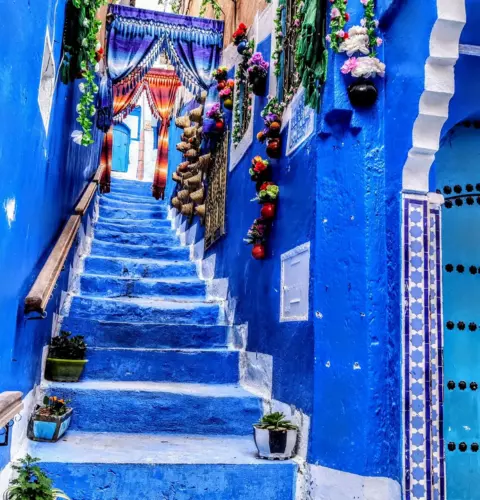
Flying from Australia to Morocco takes around 18-24 hours including layovers in the Middle East or Europe. Direct flights are not available.
Search for connecting flights on airline sites like Etihad, Qatar, Emirates and Turkish or use flight aggregators like Skyscanner to compare fares and routes.
No, Australians can get a free 90-day tourist visa on arrival when entering Morocco. Just have at least 6 months validity left on your passport.
Spring (March-May) and fall (September-October) offer pleasant weather. Avoid peak summer heat and crowds in July-August.
Yes, Morocco is very safe, especially in the tourist areas. Basic precautions apply as in any country. Dress conservatively and avoid isolated areas at night.
Moroccan Travel Expert
Plan an Entertaining Moroccan Holiday Now!
We can help you fit your stay and experience within your allotted budget.
- Tips and travel advice for Morocco
Book your individual trip , stress-free with local travel experts
Select Month
- roughguides.com
- travel-advice
- Travel guide
- Itineraries
- Local Experts
- Travel Advice
- Accommodation
Plan your tailor-made trip with a local expert
Book securely with money-back guarantee
Travel stress-free with local assistance and 24/7 support
Valentino Ellis
Our tour was fabulous. Ali was our driver and also one of our tour guides. We had a wonderful time -- Morocco is amazing and we cannot recommend Ali highly...
Moroccan culture is a vibrant mix of Arab, Berber, and African influences, reflected in its cuisine, music, and traditions. Millions travel each year to Morocco’s cities , such as Marrakech, Fez, and Rabat, to experience the ancient medinas, palaces, and mosques that showcase their historical significance. Here’s our round-up of Morocco travel advice, to ensure you have a great trip.
Travel advice and tips for visiting Morocco
Is morocco safe.
- How to get to Morocco
How to get around Morocco
Is morocco expensive.
- Best time to visit Morocco
How many days do you need in Morocco?
Do you need a visa, travelling to morocco with kids, what to wear in morocco, what to eat while in morocco.
From safety concerns to budgeting and choosing the best time to visit, there are several aspects to keep in mind when creating your itinerary. This guide is a combination of Morocco travel tips from our travel experts to answer your questions about this North African country. We’ll cover what to eat, what to wear, how to get around, and other travel advice.

Waves on Imsouan Beach, Morocco © Shutterstock
Morocco is generally considered safe, but it's essential to keep your belongings secure. While Morocco doesn't have a high crime rate, it's wise to avoid carrying large amounts of cash or valuables, especially in cities like Casablanca and Tangier, and to a lesser extent Fez and Marrakesh .
Mugging incidents are rare; theft typically occurs through stealth or scams. Remain vigilant at transport hubs and in crowded areas where pickpockets may target tourists. Credit card fraud is also relatively common, so be cautious when using your card and keep an eye on ATMs.
To minimise the risk of scams, stick to official guides identifiable by their large brass "sheriff's badge." Unofficial guides may be genuine, but it's harder to verify their credentials.
Morocco follows Islamic laws and customs, so it's important to respect local traditions, laws, and religions. Be mindful of your actions, especially during Ramadan or when visiting religious sites, to avoid causing offense.
For more information, see the UK Government’s foreign travel advice page , or the US Department of State’s travel advisory .
Morocco for women travellers
For women travellers, experiencing Morocco can be incredibly rewarding, but it's important to be aware of certain considerations. Solo female travellers may encounter more challenges and potential dangers, particularly in cities like Fez and Casablanca, where street harassment is unfortunately very common. However, destinations like Chefchaouen and Marrakech tend to offer slightly better experiences.
For those less experienced with solo travel, planning a group trip might be preferable to enhance safety and ease of navigation.
While it's not mandatory for non-Muslim women to wear a headscarf in Morocco, it may be appreciated, especially when visiting religious sites. Carrying a lightweight scarf that can be draped over your head when needed is a practical and respectful option.
Morocco for LGBTQ+ travellers
For LGBTQ+ travellers , visiting Morocco can present both opportunities and challenges. Morocco continues to attract LGBTQ+ visitors, however, it's essential to be aware of the legal and societal realities.
Morocco lacks official "gay hot spots" or LGBTQ+ celebrations due to the illegality of homosexuality. Hate speech from public figures and religious leaders adds to the challenges faced by LGBTQ+ individuals. Nevertheless, there are some LGBT-friendly establishments in urban areas like Marrakech and Casablanca, where a relatively more tolerant atmosphere can be found compared to rural regions.
Transgender and gender-nonconforming individuals may encounter even greater discrimination in Morocco. While there are no specific laws targeting transgender people, societal attitudes towards gender identity can be conservative, leading to potential discrimination, harassment, or violence.
Despite these challenges, LGBTQ+ travellers can still enjoy a great trip to Morocco. It's important to be mindful of local laws and customs and to take appropriate precautions for personal safety.

Natural stone arches reaching over the sea, Morocco © Shutterstock
For most travellers getting to Morocco means flying into one of its international airports. Mohammed V International Airport, located near Casablanca, is the busiest airport in Morocco, welcoming flights from major cities worldwide. Meanwhile, Menara Airport in Marrakesh offers convenient access to the southern part of the country.
Prices are at their highest during the summer months of June and August, as well as around Christmas and the New Year.
How to get to Morocco from the UK & Ireland
If you're coming from the UK or Ireland, direct flights are readily available from major airports such as London Heathrow, Gatwick, and Dublin. Airlines like British Airways, Royal Air Maroc, and Ryanair offer frequent services to Casablanca and Marrakesh. Keep an eye out for budget-friendly deals, especially if you're flexible with your travel dates.
Alternatively, if you're interested in a more leisurely journey, you could fly into mainland Europe, particularly France, Spain, or Gibraltar. From here, you can take a cruise ship for a scenic voyage across the Mediterranean Sea.
How to get to Morocco from the US & Canada
Many major airlines operate direct flights to Morocco from hubs like New York City, Los Angeles, and Toronto. Keep in mind that these flights can be lengthy, with durations averaging between 7 to 10 hours depending on your departure city.
If you're looking to save some cash, consider booking a flight with a layover in a European city like London, Paris, or Amsterdam. This might add some extra travel time, but it can often result in significant savings on airfare.

Traditional Moroccan mint tea with sweets © Shutterstock
Once in Morocco, getting around on public transport is generally easy. The country's railway system efficiently connects major cities such as Casablanca, Marrakech, and Fez. For a more budget-friendly mode of transportation, buses traverse both popular tourist destinations and off-the-beaten-path locales.
Renting a car gives you the ultimate freedom to explore Morocco on your own terms. Whether you're chasing sunsets along the coast or winding your way through the Atlas Mountains, having your own wheels unlocks a lot of the country that would otherwise be missed.
That said, if truly you're keen to dive deep into Moroccan culture, consider hiring a local guide.
See our in depth guide to getting around Morocco .
In general, expenses in Morocco for food, lodging, and transportation are relatively low compared to Europe and North America. Exploring medinas, visiting historical sites, or trekking through the Atlas Mountains won't break the bank. However, keep in mind that certain activities, such as desert tours or camel rides, may come with a higher price tag.
Accommodations in Morocco cater to a range of budgets, from budget hostels to luxury hotels and riads. Prices can vary depending on location. In remote areas, where goods must be transported from afar, expect higher prices for necessities.
When it comes to dining, you can find inexpensive meals at local eateries for around £6 ($7 USD), while fine dining experiences may cost up to £70 ($88 USD).
Costs per day
If you stay in the cheaper hotels (or camp out), eat local food, and share expenses and rooms with another person, £250 (or $300 USD) each a week would be the bare minimum to survive on. Spending £350 (or $450 USD) per person per week is more realistic. This budget allows for a more comfortable lifestyle, where you can enjoy a few more luxuries without worrying too much about expenses.
If comfort is your priority and you're willing to splurge a bit, aiming for a budget of £1200–1600 (or $1500–2000 USD) per week per person should provide a cushy experience with ample room for indulgence.
Keep in mind additional expenses for souvenirs, such as rugs, carpets, and handicrafts. Also, be prepared to encounter poverty during your travels. While you can't solve systemic issues, small acts of generosity, like tipping, can make a meaningful difference to those in need.
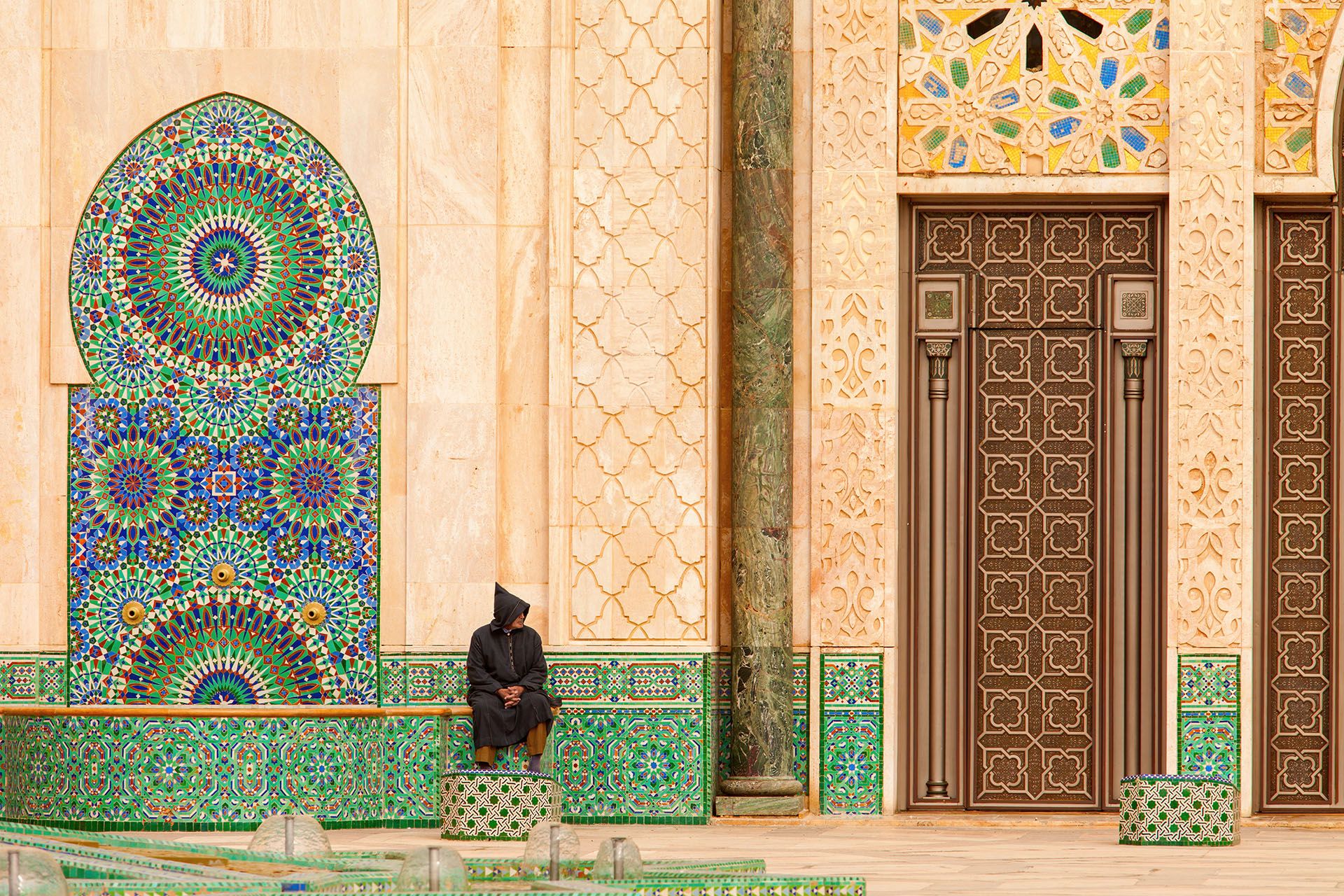
Grande Mosquée Hassan II, Casablanca © Shutterstock
For pleasant weather, aim for spring ( March to May ) or fall ( September to November ). During these seasons, temperatures are mild, and there's less rainfall compared to other times of the year.
If you're heading to coastal areas like Casablanca or Essaouira, summer (June to August) is popular, but be prepared for hot temperatures. Inland regions like Marrakech and the Sahara Desert can be scorching during summer.
Winter (December to February) brings cooler temperatures, fewer crowds, and a taste of Moroccan culture without the intense heat.
For a more in-depth look, see our guide to the best time to visit Morocco .
To get a good feel for Morocco, you’ll want atleast a seven-day trip . This timeframe allows you to hit the highlights like Marrakech, Fez, and even squeeze in a day trip to the Sahara Desert.
Stretch it to ten days , and you’re likely to enjoy a more relaxed pace during your trip. This allows you to stroll the souks without rushing. Maybe even a day spent by the coast in Essaouira.
But if you want to truly dive deep into Morocco, you’ll want to aim for a full two weeks. With fourteen days, you can take it slow, explore off-the-beaten-path gems like Chefchaouen, trek the Atlas Mountains, and really see Morocco. You’ll have plenty of time for activities,to explore historical sites like the ancient Roman ruins of Volubilis, or embark on a camel trek into the Sahara for a night under the stars.
For inspiration, see our Morocco itineraries .

Rose festival in Kelaa Mgouna © gary jim/Shutterstock
If you hold a full passport from the UK, Ireland, the US, Canada, Australia, New Zealand or any EU country, you don’t need a visa to enter Morocco as a tourist for up to ninety days. However, your passport must be valid for at least six months beyond your date of entry, and always double-check your visa requirements before departure as the situation can change. South African citizens are among those who need a visa; applications should be made to the Moroccan embassy or consulate in your country of residence.
Travelling with small children in Morocco can be a once-in-a-lifetime experience . Moroccan culture tends to revolve around families, and locals often extend warm hospitality to children.
However, as a parent, you may encounter a few challenges along the way . For instance, it's important to note that amenities like baby changing rooms may not be readily available in airports, hotels, or restaurants. Being prepared with your own supplies can be helpful.
Additionally, the cultural experience in Morocco may differ significantly from what your children are accustomed to. It's wise to introduce them to the idea of embracing new sights, sounds, and customs beforehand to prevent any potential overwhelm.
When it comes to transportation, keep in mind that children small enough to share your seat on buses and grands taxis typically travel for free, while older kids may need to pay the full adult fare. On trains, there are often discounts available for children under a certain age.
Seeking out family-friendly accommodations can enhance your trip experience. Many hotels and riads offer spacious rooms, and amenities such as swimming pools, making it easier for families to enjoy their stay comfortably.

Tangia, mutton dish Marrakechia, Morocco © keeshaskitchen.com/Shutterstock
In conservative areas or when visiting religious sites like mosques or medinas, it's essential to dress modestly. For both men and women, covering your shoulders and knees is a good rule of thumb.
Opt for loose-fitting clothing that provides coverage without sacrificing comfort. Flowy maxi dresses, loose pants, and long-sleeved tops are perfect choices for keeping cool in the heat.
While swimwear is acceptable at beaches and resorts , it's polite to cover up when walking to and from these areas. Bring along a cover-up or sarong to throw on over your swimsuit when you're not by the water.
Morocco's streets can be uneven and dusty, so make sure you have comfortable footwear.
Keep in mind that cultural norms regarding modesty can vary between urban and rural areas, as well as among different communities within Morocco.
Moroccan food is known for its combination of sweet and savoury flavours. You’ll want to start your day with a traditional Moroccan breakfast of msemen, a flaky, square-shaped pastry. It’s often eaten with honey or jam, and accompanied by a cup of mint tea.
For lunch, try an authentic Moroccan couscous, a staple dish made from steamed semolina grains served with succulent meat or vegetables. Or try bastilla, a savoury-sweet pie filled with layers of flaky pastry, and spiced meat, and topped with a dusting of powdered sugar and cinnamon.
For dinner, don’t miss the chance to experience a Moroccan mezze spread, including Moroccan baba ganoush and tangy preserved lemons.
Another important thing to try while in Morocco is the local baklava or sfenj.
The Rough Guides to Morocco and related travel guides
In-depth, easy-to-use travel guides filled with expert advice.
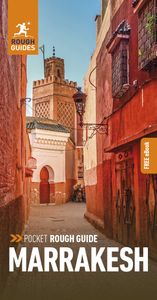
Travel advice for Morocco
From travel safety to visa requirements, discover the best tips for visiting Morocco
- Culture and Etiquette in Morocco
- Eating and drinking in Morocco
- How to get around in Morocco
- Shopping tips for Morocco
- Travelling with children in Morocco
- How to get a Morocco Visa
Find even more inspiration for Morocco here

Ready to travel and discover Morocco?
Get support from our local experts for stress-free planning & worry-free travels.
- Where to stay
- Travel advice
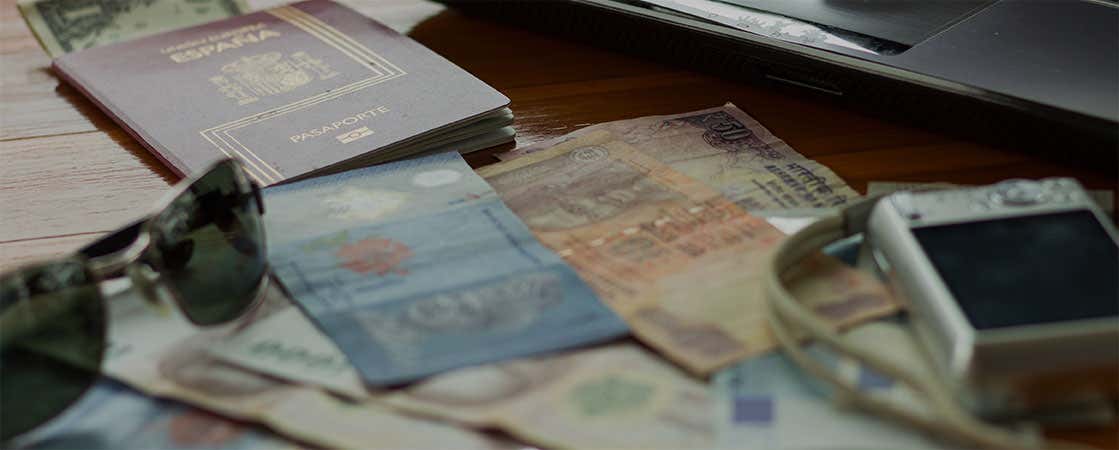
- General Information
Plan your trip
Travel advice for morocco.
Morocco has very flexible borders, and entry visas are required for very few countries. Depending on your nationality, on this page you'll find info about all the necessary documents you'll need in order to travel to Marrakech:
US Citizens
American citizens traveling to Morocco need a valid passport at the time of entry and departure. However, they do not need a visa if they stay in the country for less than 90 days . Please note that you'll need one page of your passport for the entry stamp, so make sure you have enough space. Additionally, the export of Moroccan dirhams is not permitted.
Australian Citizens
Australian citizens visiting Morocco do not need a visa to enter the country. Before you travel, make sure your passport is valid for at least six months from your date of return to Australia. You'll need a whole page of your passport for the entry stamp, so make sure you have enough space. Moreover, it's important that your passport is stamped , otherwise, you could have problems leaving the country.
EU, EEA, and Swiss Citizens
As citizens of the European Union and European Economic Area, you won't need a visa to enter the country if you're traveling as a tourist for up to three months. Make sure your passport is stamped correctly, otherwise you might experience problems leaving the country. Your passport has to be valid for the duration of your trip.
EU member countries
Germany, Austria, Belgium, Bulgaria, Cyprus, Croatia, Denmark, Slovakia, Slovenia, Spain, Estonia, Finland, France, Greece, Hungary, Ireland, Italy, Latvia, Lithuania, Luxembourg, Malta, Netherlands, Poland, Portugal, United Kingdom, Czech Republic, Romania, and Sweden.
EEA countries
Island, Liechtenstein, and Norway.
Citizens of the following countries do not need a visa to enter Morocco
The following countries do not require a visa for visits lasting less than 90 days but require a valid passport to enter Morocco.
Andorra, Antigua and Bermuda, Argentina, Bahamas, Barbados, Bolivia, Bosnia, Brunei, Canada, Chile, Costa Rica, El Salvador, Guatemala, Honduras, Hong Kong, Israel, Japan, Korea, Macao, Malaysia, Mauritius, Mexico, Monaco, Montenegro, Nicaragua, New Zealand, Panama, Paraguay, Saint Kitts and Nevis, San Marino, Serbia, Seychelles, Singapour, Taiwan, Uruguay, and Venezuela.
Other countries
Citizens of countries not previously mentioned like South Africa will need a visa to enter the Kingdom of Morocco. We suggest asking for more information at the Embassy of Morocco in your country. You can also check out Morocco’s Minister of Foreign Affairs and Cooperation.
- Morocco’s Ministery of Foreign Affairs and Cooperation
You may also be interested in
In Introducing Marrakech, you'll find all the necessary information to plan your holidays and make the most of your stay in this fascinating city.
Travel Insurance
Although Morocco is at a short distance from Europe, its healthcare system is very different to the old continents’. Find out about the various types of insurances before your trip.

Countries, economies and regions
Select a country, economy or region to find embassies, country briefs, economic fact sheets, trade agreements, aid programs, information on sanctions and more.
International relations
Global security.
- Australia and sanctions
- Australian Safeguards and Non-proliferation Office (ASNO)
- Counter-terrorism
- Non-proliferation, disarmament and arms control
- Peacekeeping and peacebuilding
Regional architecture
- Asia Pacific Economic Cooperation (APEC)
- Association of Southeast Asian Nations (ASEAN)
- East Asia Summit (EAS)
- Australia and the Indian Ocean region
- Pacific Islands regional organisations
Global themes
- Child protection
- Climate change
- Cyber affairs and critical technology
- Disability Equity and Rights
- Gender equality
- Human rights
- Indigenous peoples
- People Smuggling, Human Trafficking and Modern Slavery
- Preventing Sexual Exploitation, Abuse and Harassment
- Australia’s treaty-making process
International organisations
- The Commonwealth of Nations
- United Nations (UN)
- World Trade Organization
Foreign Arrangements Scheme
Trade and investment, about free trade agreements (ftas).
- The benefits of FTAs
- How to get free trade agreement tariff cuts
- Look up FTA tariffs and services market access - DFAT FTA Portal
- Discussion paper on potential modernisation – DFAT FTA Portal
About foreign investment
- The benefits of foreign investment
- Investor-state dispute settlement (ISDS)
- Australia's bilateral investment treaties
- Australia's foreign investment policy
For Australian business
- Addressing non-tariff trade barriers
Expo 2025 Osaka, Kansai
Stakeholder engagement.
- Ministerial Council on Trade and Investment
- Trade 2040 Taskforce
- First Nations trade
Australia's free trade agreements (FTAs)
- ASEAN-Australia-New Zealand (AANZFTA)
- Chile (ACLFTA)
- China (ChAFTA)
- Hong Kong ( A-HKFTA & IA)
- India (AI-ECTA)
- Indonesia (IA-CEPA)
- Japan (JAEPA)
- Korea (KAFTA)
- Malaysia (MAFTA)
- New Zealand (ANZCERTA)
- Peru (PAFTA)
- Singapore (SAFTA)
- Thailand (TAFTA)
- United Kingdom (A-UKFTA)
- USA (AUSFTA)
- Trans-Pacific Partnership (TPP)
- European Union (A-EUFTA)
- India (AI-CECA)
- Australia-UAE Comprehensive Economic Partnership Agreement
- Australia-Gulf Cooperation Council (GCC)
Trade and investment data, information and publications
- Fact sheets for countries and regions
- Australia's trade balance
- Trade statistics
- Foreign investment statistics
- Trade and investment publications
- Australia's Trade through Time
WTO, G20, OECD, APEC and IPEF and ITAG
Services and digital trade.
- Service trade policy
- Australia-Singapore Digital Economy Agreement
- Digital trade & the digital economy
Development
Australia’s development program, performance assessment.
- Development evaluation
- Budget and statistical information
Who we work with
- Multilateral organisations
- Non-government organisations (NGOs)
- List of Australian accredited non-government organisations (NGOs)
Development topics
- Development issues
- Development sectors
2030 Agenda for Sustainable Development
- Sustainable Development Goals
Where we deliver our Development Program
Humanitarian action.
Where and how Australia provides emergency assistance.
People-to-people
Australia awards.
- Australia Awards Scholarships
- Australia Awards Fellowships
New Colombo Plan
- Scholarship program
- Mobility program
Public diplomacy
- Australian Cultural Diplomacy Grants Program
- Australia now
- UK/Australia Season 2021-22
Foundations, councils and institutes
- Australia-India Council
- Australia-Indonesia Institute
- Australia-Japan Foundation
- Australia-Korea Foundation
- Council for Australian-Arab Relations (CAAR)
- Council on Australia Latin America Relations (COALAR)

International Labour Mobility
- Pacific Labour Mobility Scheme
- Agriculture Visa
Australian Volunteers Program
Supporting organisations in developing countries by matching them with skilled Australians.
Sports diplomacy
Australia is a successful global leader and innovator in sport.
A global platform for achievement, innovation, collaboration, and cooperation
About Australia
Australia is a stable, democratic and culturally diverse nation with a highly skilled workforce and one of the strongest performing economies in the world.
Australia in Brief publication
This is the 52nd edition of Australia in Brief, revised and updated in February 2021
Travel advice
To help Australians avoid difficulties overseas, we maintain travel advisories for more than 170 destinations.
- Smartraveller – travel advice
International COVID-19 Vaccination Certificate
Prove your COVID-19 vaccinations when you travel overseas.
- Services Australia
The Australian Passport Office and its agents are committed to providing a secure, efficient and responsive passport service for Australia.
- Australian Passport Office
24-hour consular emergency helpline
- Within Australia: 1300 555 135
- Outside Australia: +61 2 6261 3305
- Getting help overseas
- Visas for Australians travelling overseas
- Visas to visit Australia
24-hour emergency consular support
If you're an Australian citizen and you have serious concerns about your welfare or that of another Australian overseas, contact your local Australian Embassy, High Commission or Consulate, or call our 24-hour Consular Emergency Centre on
- 1300 555 135 within Australia
- +61 2 6261 3305 from anywhere in the world.
Read more about getting help overseas on Smartraveller.
We maintain travel advisories on Smartraveller for over 175 destinations, assigning an overall advice level to each. The advice levels reflect the risks for Australian travellers in each destination. We also provide general advice on a range of travel topics.
Visit Smartraveller to explore our travel advice for all destinations .
We continually review and update our travel advice based on credible information. Stay up to date with any changes by subscribing for updates .
Visit the Australian Passport Office for more about passports.
The Department of Foreign Affairs and Trade does not issue visas for overseas travel or visiting Australia and can’t provide specific information on visas.
Read about visas for Australians travelling overseas .
Find out about visas to visit Australia .
18 things to know before traveling to Morocco

Sep 5, 2024 • 7 min read

Get ready to weave your way through the markets and medinas of Morocco. Getty Images
I am originally from the UK and have been living in Morocco since 2018. There are things I wish I'd known before jumping headfirst into the seemingly lawless world of Moroccan taxis and bargaining in the souqs.
Morocco reveals the full spectrum of real life: the good, the bad, the ugly and the oh-so beautiful. For some visitors, Morocco can be a huge culture shock. But with some awareness and understanding, it is possible to appreciate these differences, connect more deeply and see the country through a different lens without trying to change it.
1. Plan your itinerary loosely and allow for changes
Research the places in Morocco you’d like to visit but leave wiggle room for changes along the way and enjoy the spontaneity that Morocco allows. While it’s possible to pre-book tours and activities, it’s usually just as easy to reserve them when you arrive in the country.
2. Take public transport, especially in cities
Driving in cities such as Casablanca and Marrakesh is best left to the locals. Getting around Morocco is easy, even without a car. An excellent train network links many cities, including Africa’s first high-speed train , Al Boraq, between Casablanca and Tangier . A comfortable and reliable bus network connects towns big and small. Book train and bus tickets a day or two in advance to ensure the travel time you'd like.

3. Book professional guides
To get the most out of your trip to Morocco, use a guide who has in-depth expertise and speaks your language. In cities, check with the local tourism office or your accommodations for recommendations for licensed guides in the area. If you’re surfing, check ISA’s directory of certified instructors .
Hiking guides are mandatory for climbing Mt Toubkal in the High Atlas. Check with Bureau des Guides .
4. Understand the written and unwritten rules of the road
In Morocco, you drive on the right side of the road and seatbelts are mandatory, even though some taxis don't have them. Car horns are used often – not in an aggressive way, but as a means of communication.
Watch out for people, bicycles, motorcycles and animals coming from all sides. Avoid driving at night because some vehicles do not have or use their headlights. Take notice of the speed limits and the roundabouts that have stoplight systems. If you’re stopped for speeding – police speed checks are common – or other penalties, having cash on you to pay fines – usually between Dh150 and Dh300 (US$15 to US$30) – is preferable to going to a local police station.
5. Cash or card?
The Moroccan dirham is a closed currency, which means you cannot use or get it outside the country. Morocco’s rural areas still operate on a cash economy, but cards are widely accepted in towns and cities.
6. Learn some of the lingo
A mixture of French, Arabic, Amazigh and English is spoken in Morocco, depending on where you are in the country. Don't expect everyone to speak English. Apps like Google Translate can be useful, but learning some basic Arabic phrases will reward you with feeling more connected and engaged with people you meet.

7. Practice the art of haggling
Haggling is a game and part of the shopping experience in Morocco . Try not to get frustrated – the ideal scenario is that both sides come away feeling like they got a fair price.
For big purchases, do your research, have a price in mind or shop around until you do. Sometimes vendors say to pay what you feel like, so if you don't have a price, ask some questions: how many hours did it take to make? Where did the materials come from and at what price?
Souqs are filled with fake tennis shoes, which are just that: fakes. Many Moroccans don't care whether their Nikes are original; they just want the best price for the latest styles.
8. Respect the motto of "God, king and country"
These words are etched on hills around the country. Islam is the state religion, and the rules of Islam are applied to personal matters in the same way that state law works in other countries. It is illegal to speak disrespectfully about religion or the king. Non-Muslims are not permitted to enter mosques or cemeteries, except the Hassan II Mosque in Casablanca . Friday is a holy day across the country, and most people take a few hours off in the afternoon to go to the mosque and eat couscous with their families afterward. Check business opening times before you visit if you're heading to a particular place on a Friday.
The holy month of Ramadan and the celebrations of Eid offer a different cultural experience, and during these times many places will be closed.
9. Things to know before going to Marrakesh
Marrakesh is the most popular city in Morocco for visitors, so pre-book entrance tickets to major attractions such as Jardin Majorelle and Musée Yves Saint Laurent online to avoid waiting in line. The Marrakesh medina comes to life around 5 pm, but the "pink city" is more than just the medina – spend time exploring Gueliz and step off the main boulevards onto the leafy side streets to discover pretty street cafes, bistro restaurants and small indie boutiques.

10. The dress code depends on where you are
To visit the Hassan II Mosque and other religious sites, visitors – both men and women – must cover to their shoulders and knees. Dress modestly in cities and towns to avoid unwanted attention. At bars and nightclubs, almost anything goes, but in rural areas, cover up and be respectful of the local customs.
At the beach, you can wear shorts, dresses, vest tops and swimwear including bikinis. Pack comfortable footwear that’s suitable for uneven roads and a scarf to cover your shoulders.
11. Ask before taking photos of people
No matter where you are in the world, it’s best to ask permission before taking someone’s photo. Many people are fine with it, but others aren’t. Some may ask for money. Do not take photos of military or government buildings. Drones are not allowed in Morocco without special permission.
12. Learn how to deal with the hassle
Simply ignore people who offer goods that you do not want. There's no need to be polite to everyone who wants to sell you something. By not reacting, they'll get bored and walk away.
In some places you may receive comments and, at worst, inappropriate behavior, but shouting "Police!" will send these people away. In Marrakesh, there's also a high chance you will alert the undercover tourist police.

13. Can you drink alcohol in Morocco?
Even though alcohol is forbidden by Islamic law, it is widely available and sold in licensed wine shops and international grocery stores. Not all bars and restaurants serve alcohol.
14. Eat with your right hand
Moroccan cuisine such as tagines and grilled fish are traditionally eaten with bread using your right hand. The left hand is considered unclean because it’s typically the hand used when going to the toilet.
15. It’s okay to get lost
Getting lost is part of the joy of exploring Morocco with its unmarked roads, the maze of souq alleys and areas of no cell phone reception. Relax but be aware of your surroundings and ask for help if you need it.
In medinas, it’s helpful to know that if the street sign is a hexagon, it's a dead end. If it’s a square, it’s a through street.
YouTube video player
16. Don’t drink the tap water
Morocco’s tap water is not safe to drink. Bring a water bottle with a filter to avoid buying plastic.
17. Bring tissues for public toilets
Some public toilets do not have toilet paper. Unless you are comfortable using water to clean yourself, keep a pack of tissues and some anti-bacterial hand gel or wipes on you.
18. Street cats and dogs are everywhere and part of the community
It’s best not to feed street animals from your table because they might not leave, but you can keep leftovers and feed them elsewhere on the street. If you're an animal lover, find out if there is a rescue center where you're staying and show your support with a donation or by volunteering your time.
This article was first published Oct 15, 2023 and updated Sep 5, 2024.
Explore related stories

Tips & Advice
Sep 6, 2024 • 6 min read
Morocco is a country of dazzling diversity with mountains, deserts, beaches and ancient cities. Here are the best places to visit in Morocco.

Sep 4, 2024 • 14 min read
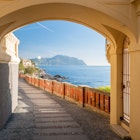
Aug 16, 2024 • 9 min read

Jun 26, 2024 • 6 min read

May 20, 2024 • 5 min read

Mar 11, 2024 • 5 min read

Feb 7, 2024 • 5 min read

Jan 31, 2024 • 6 min read

Jan 17, 2024 • 8 min read

Search Smartraveller
Travel advice explained.
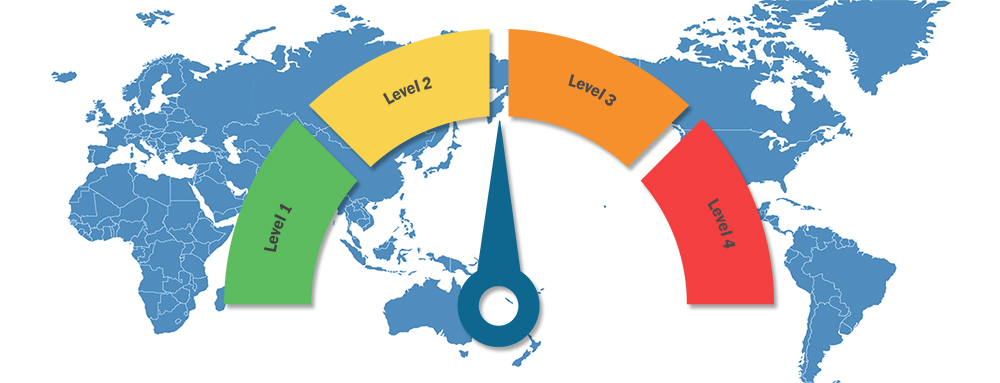
When travelling overseas, it's your responsibility to take care of your safety and wellbeing. Our travel advice will help you understand the risks and what you can do to avoid or handle difficulties.
This page explains:
- our travel advisories for destinations and our general advice
- how we develop and update our travel advisories
- what each advice level means in travel advisories .
Don't expect the Australian Government to be able to get you out of trouble during your travels. Read the Consular Services Charter for what we can and can't do to help you overseas.
Smartraveller travel advice
Australians love to travel internationally, and many of us live abroad. To help Australians avoid difficulties overseas, we offer advice on a variety of travel-related topics.
This includes publishing official travel advisories and advice to help you avoid problems while overseas. Our travel advice helps Australian travellers make informed decisions.
Travel advisories
We maintain travel advisories for 178 destinations, assigning an overall advice level to each. The advice levels reflect the risks for Australian travellers in each destination.
We continually review and update our travel advice based on credible information. Each travel advisory provides destination-specific information about:
- local contacts.
It's your responsibility to be informed about all the destinations you're visiting, including those you’re transiting through. This includes understanding risks and planning for your safety . It's also your responsibility to stay informed throughout your travels in case circumstances change.
Travel advice for other destinations
We don't publish travel advisories for countries and territories with very few Australian travellers and/or where the risks are low.
We regularly review whether travel advisories are needed for these destinations. Our consular partners in Canada , the United Kingdom or the United States also publish destination travel advice that you may wish to read.
General travel advice
We prepare and publish general advice on a range of travel topics. Our advice helps Australians to be informed and prepared before they go. It also helps Australians to stay safe while overseas.
See our general advice for before you go and while you're away . Also see our advice on what to do if you're overseas and things go wrong .
How we develop travel advisories
We frequently review our travel advisories. However, we don't change them for all issues and incidents.
We update travel advisories if there are new or increased risks to Australians. This can be in response to new developments, such as credible intelligence reporting, major protests or unrest , new entry requirements or a natural disaster .
Our advisories are an objective assessment of the risks Australians face overseas. They're not influenced by diplomatic, political or commercial considerations. In our travel advice, we adhere to the principle that there is no difference in information about security and other risks provided to Australian travellers and Australian government employees.
Sometimes advisories are updated with new information without changing the level of advice. If we judge that the risk for Australians hasn't changed, we won't change the advice level.
If we change the advice level, it's usually because of a specific event or changes to local circumstances. When we change it, we'll state this in the 'Latest update' section at the top of the travel advisory page.
We use a range of information sources in our travel advisories. These include:
- Australian diplomatic missions overseas
- threat assessments produced by ASIO's National Threat Assessment Centre
- analysis of common problems Australians experience overseas
- intelligence from our consular partners in the US, UK, NZ and Canada
- information from other government agencies, such as the Department of Health
- media and open-source reporting
- feedback from travellers.
If a travel advisory hasn't been updated for several months, it's not out of date. There's just been no need to update it.
What does 'advice level' mean?
We assign each destination an official advice level of 1, 2, 3 or 4. These levels reflect the risk for average Australian travellers to this country. For each level, we provide advice to help Australians avoid or reduce the risks.
A higher advice level means higher risk. The levels are:
- Level 1 - Exercise normal safety precautions
- Level 2 - Exercise a high degree of caution
- Level 3 - Reconsider your need to travel
- Level 4 - Do not travel .
It's important to read and understand the advice level for each country you're travelling to or through. The advice level can affect your safety and your travel insurance .
Where to find the advice level for your destination
Every travel advisory displays an overall advice level for the country. The advice level is shown on the bar at the top of the travel advisory . The advice level is also shown by the colour on the country map.
Sometimes regions or cities within the country have different levels. This can be because of specific risks or safety concerns. We publish this in the travel advisory on the page and on the map.
Changes to advice levels
It's your responsibility to keep informed about any changes to the advice level. If it increases, take extra precautions and consider the advice carefully.
- Subscribe to get an email when we update the travel advice for your destinations. You can also subscribe for news updates.
- Follow Smartraveller on Facebook , X and Instagram to get updates on social media. You can also follow the social media accounts of your nearest Australian mission for local information and advice.
Read our information for each advice level to understand the risks. Take the right precautions before you go and while you're away .
Travel insurance and advice levels
Before booking travel and purchasing travel insurance , ensure you're aware of and comfortable with the advice level for your destination . Some policies will only allow you to cancel for safety reasons if the advice level increases after you've bought your policy.
If the advice level hasn't changed, most travel insurers won't cover your cancellation costs if you decide not to go for safety reasons.
If the travel advice level is raised to ' Level 3: Reconsider your need to travel ' or ' Level 4: Do not travel ' and you want to cancel your trip, contact your insurer. Find out if you can make a claim to cover cancellation costs or changes to your itineraries.
Each travel insurance company will be different. Check with yours directly.
Check the inclusions carefully before you purchase.
Level 1: Exercise normal safety precautions
Use common sense and look out for suspicious behaviour, as you would in Australia.
At level 1, the security environment is similar to that of a large Australian city.
This doesn't mean the local situation will be the same as in Australia. Laws and social customs could differ significantly. You could face terrorist attacks , civil unrest , violent crime or unique health threats. But overall, the risks are not greater than those you'd face in an Australian city.
If you travel to a location with an advice level of 1, it's your responsibility to:
- monitor the media and other sources for changes to local travelling conditions, safety, health situation and security concerns
- be aware of local differences and, as appropriate, take similar precautions to those you would take in Australia
- check entry requirements before you travel.
Keep in mind that being in an unfamiliar location without your support mechanisms always creates additional challenges, even if the local environment is similar to Australia.
Level 2: Exercise a high degree of caution
Pay close attention to your personal security and the current health situation. Monitor the media for new and existing risks.
At level 2, there are more or higher risks than what you would typically find in a large Australian city. We're not saying 'don't go' to this location. But you should do your research and take extra precautions.
The level may reflect a weak law-and-order system, where violent crime is common. The destination may lack some key public services, such as a responsive police force.
In some cases, there may be a risk that the security environment could change with little warning. This level may also reflect a passing event, such as political unrest or a short-term increase in a location's domestic terrorism level.
If you travel to a location with an advice level of 2, it's your responsibility to follow all the advice for level 1, as well as the following.
Before you go
- Understand the basics of the political and security situation.
- any dangerous areas of a city
- types of crimes
- risky modes of transport
- specific precautions for women or LGBTQIA+ travellers
- any behaviour that may offend or break the law.
- Check your travel insurance policy and coverage, particularly if there is a travel disruption or a change in travel advice.
- Research the health situation and services available for your destination.
While you're away
- Stay in contact with your airline operator or travel provider for changes and updates.
- Be aware of religious holidays or days of national significance. Terrorists have launched attacks on these occasions.
- Understand the safety of public transport options.
- Plan your daily movements and vary your routines and travel routes.
- Avoid known flashpoints, including protest areas.
- Don't wander into unknown areas.
- Avoid or minimise your time at places that terrorists may target.
- Leave an area at the first sign of unrest or if you feel uneasy.
- Be aware of building exits and always know the safe places you can access if you feel threatened.
- Take notice of the people around you and their behaviour. Be aware that you may misinterpret some behaviour in an unfamiliar cultural setting.
- When discussing your plans, avoid sharing details that others may overhear.
- Be cautious about the information you share on social media.
- Refuse unexpected packages or offers.
- Monitor the health risks in your location.
Level 3: Reconsider your need to travel
Avoid non-essential travel. Do your research and check that your insurer will cover you. If you do travel, take extra precautions to protect yourself from security and health risks.
At level 3, there are serious and potentially life-threatening risks. This can make the destination unsafe for tourism and unsuitable for most travellers. This could be due to:
- an ongoing threat of terrorism or kidnapping
- travel disruptions
- frequent incidents of violent crime
- ongoing civil unrest
- widespread infectious disease
- other safety risks.
Think seriously about your need to travel to these places. This may mean postponing non-essential travel or choosing a less risky destination.
If you decide to travel, it's your responsibility to reduce your risks and stay safe. The Australian Government is limited in how and when it can help if you get into trouble. Conditions may change at any time. Be prepared for an extended stay or significant disruptions to travel.
These countries often have an unpredictable security environment. We may temporarily assign this advice level when there's been a major incident. This could include a natural disaster , terrorist attack , civil unrest or global pandemic that has made the destination too risky for most travellers.
Our advice levels also apply to Australian officials travelling overseas. Officials must undertake a detailed security risk assessment before travelling to these areas. They may have to adopt specific protective security measures.
If travelling to a destination with an advice level of 3, follow all the advice for levels 1 and 2, as well as the following before you go and when you get there.
- Research the political and security situation from a variety of sources before booking. Understand the risks. Check the news and social media and understand what's going on.
- Check your travel insurance policy carefully. It may not cover travel to 'reconsider your need to travel' destinations.
- Understand the health situation and risks for your destination.
- Research the health services available. Services may be strained and not be the same as you would receive in Australia.
- Pre-book accommodation in safe areas with appropriate security.
- Get local advice on your itinerary. Follow advice on areas to avoid.
- Minimise time spent in airports by scheduling direct flights if possible. Avoid stopovers in high-risk airports.
- Stay as short a time as possible. Eliminate unnecessary activities .
- Think carefully about your security at your hotel and getting around. Organise tailored security arrangements and prepare contingency plans.
- Ask your tour operator about their safety record and security arrangements. This includes safety equipment, extra security, emergency plans and evacuation procedures.
- Regularly review your security arrangements. The threat environment could change at short notice.
- Have an up-to-date will and enduring power of attorney in case you die . Designate appropriate insurance and beneficiaries.
- Be aware of the health risks for your location.
- Pre-plan your travel routes. Have contingency plans in place.
- Be prepared to change your plans in response to evolving threats.
- Avoid potential terrorism targets. Know what to do in the event of a terrorist attack .
- Stay alert and always be aware of your environment. Look out for suspicious activity or items, and report anything of concern to local authorities.
- Don't discuss travel plans with strangers. Never share personal information with people asking questions without good reason.
- Don't discuss your plans or risk management strategies where they might be overheard by others.
- Don't share information about your travel arrangements on social media.
How to minimise your exposure to risks
- Avoid travelling alone, especially after dark and on long trips.
- Minimise travelling by foot. Be vigilant in public areas.
- Before getting into a vehicle, check it for anything suspicious.
- Make sure any vehicles you use are in good working order and have enough fuel to get you out of unexpected trouble.
- When driving , keep your car doors locked and your windows up.
- Watch for people following you. Be ready to take evasive action.
- Avoid using public transport. Only use trusted private transport.
- Check the safety record of your travel service providers. Always use available safety equipment, even if others don't.
- Never take something across a border for someone else. You could be arrested or jailed if it contains something illegal, such as drugs .
- Don't meet strangers in your hotel room or unknown or remote places.
Make contingency arrangements
- Wherever you are, have a plan of action in case the environment becomes unsafe.
- Be prepared to change your plans at short notice. This could include changing meetings or activities to less prominent areas or less dangerous days.
- Always carry a charged phone. Save local emergency contact details in it.
- Tell a trusted person where you're going and when you plan to return. Discuss and agree on what action they should take if you don't return at the planned time.
- Maintain contingency kits. Include medical supplies, food, water and fuel. This can help sustain you through any period of heightened unrest.
- Carry provisions with you when getting around .
In the event of a crisis , departure options may be severely limited. You're responsible for ensuring you can depart independently and that your travel documentation is up to date. Don't expect the Australian Government to organise your departure. See the Consular Services Charter to understand how and when we can help.
Level 4: Do not travel
If you're already in this location, you should consider leaving if it's safe to do so. If you do travel, get professional security advice. Your travel insurance policy might be void. The Australian Government may not be able to help you.
At level 4, your health and safety are at extreme risk. This may be because of a high threat of terrorist attack , conflict, violent social unres t, widespread infectious disease or critical levels of violent crime. It could be a combination of risks.
If you travel to this location, you're at a high risk of death , imprisonment , kidnapping or serious injury.
If you get into trouble, the Australian Government may be unable to help. In most cases, our ability to provide consular assistance in these destinations is extremely limited.
Any travel by Australian officials to 'Do not travel' locations is subject to high-level approval and is based on a rigorous risk assessment.
You should not travel to this location. If you travel to this location despite our advice, you should note that you may be unable to leave the location quickly if your circumstances change. If you're already in a 'Do not travel' area, consider leaving if it's safe to do so. If, despite our advice, you decide to travel to a location with a travel advice level of 4, it's your responsibility to follow all the advice for levels 1, 2 and 3, as well as the following.
- Check your travel insurance . Most standard policies won't cover you for 'Do not travel' destinations.
- Consider your security. Get independent, professional security advice. You may need to hire personal protection.
- Have robust risk management measures in place. This includes a detailed emergency management plan.
- Understand that you could die . Make sure you have an up to date will and enduring power of attorney. Designate appropriate insurance beneficiaries.
It's your responsibility to take care of your security. The Australian Government can't provide security assistance or advice.
- Exercise extreme caution.
- Follow the advice of your personal protection service.
If you die overseas in a 'do not travel' destination, it's unlikely your travel insurance will cover you. Your family will be left to deal with your death. This includes organising your funeral and bringing back your remains. They may also have to resolve legal or financial issues in the destination and in Australia.
- Read the travel advice for all the destinations you're travelling to, and through.
- Read our general travel advice and tips before you go .
- Read the Consular Services Charter for what the Australian Government can and can't do to help you overseas.
- Contact the Consular Emergency Centre if you're overseas and need urgent help .
- Read the guides for travellers , including the travel insurance buying guide (CHOICE).
Related content
The Smartraveller social media accounts include X, Facebook, Instagram, YouTube, and social bookmarking and sharing buttons.
Foreign authorities may request a document to be issued with an Apostille or an Authentication certificate before they will accept it. This is called ‘legalisation’.
Information on biosecurity processes and border controls before and after your arrival in Australia.

21 Things You Must Know Before Visiting Morocco Travel Tips
- Africa / Fez / In the City / Marrakech / Morocco
- 33 Comments
Visiting Morocco? This is what you need to know before visiting.
More and more people are visiting Morocco every year. It’s a beautiful country, and as photographers and videographers, we had a field day.
On the flip side, there were also downsides to visiting especially as a woman. If you plan on going, we put together a few pointers to help you set realistic expectations and prepare for your trip.
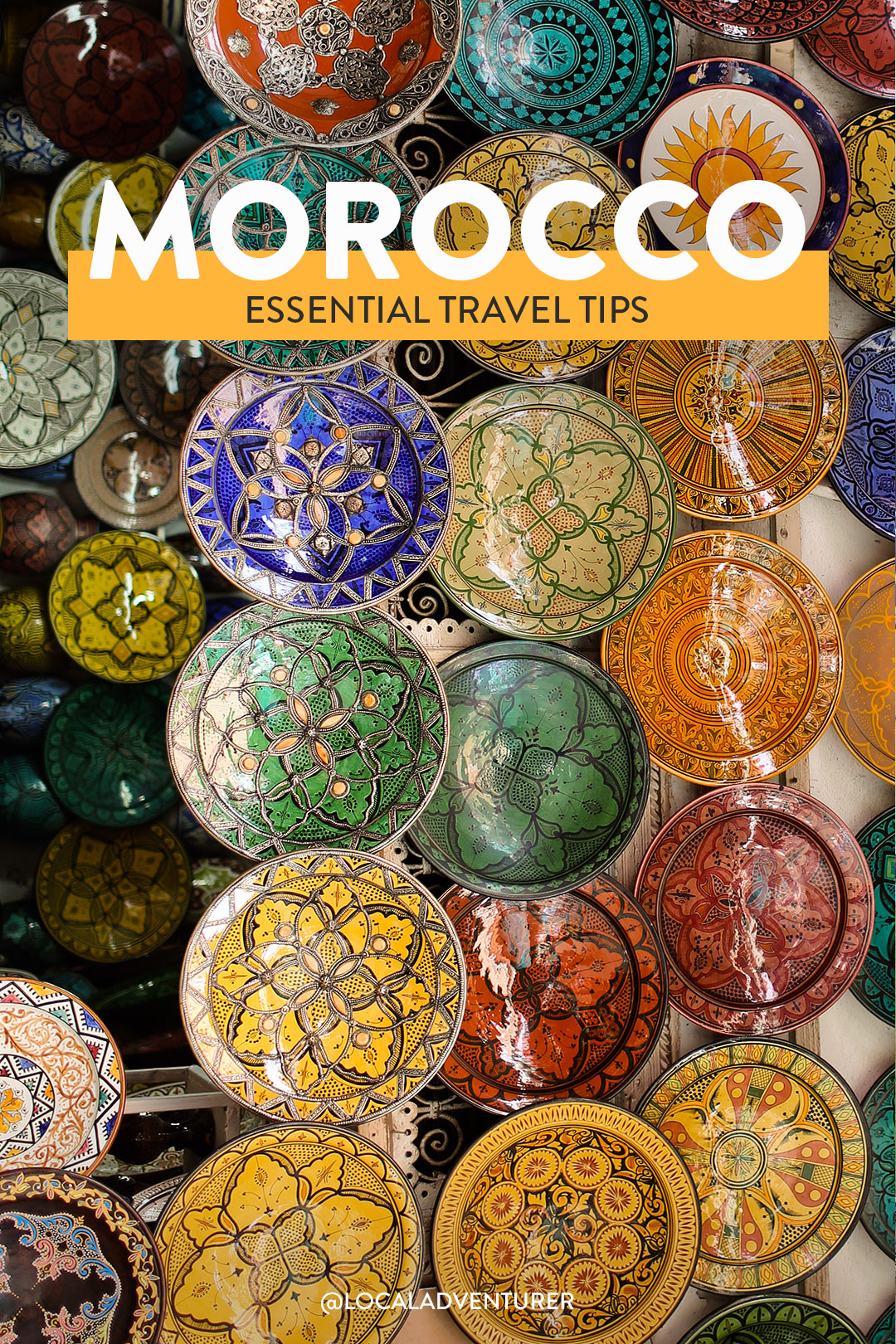
Thank you Contiki for hosting our trip. See our full 15 day trip itinerary here . All opinions are always our own. This post may contain affiliate links, where we receive a small commission on sales of the products that are linked at no additional cost to you. Read our full disclosure for more info. Thank you for supporting the brands that make Local Adventurer possible.
Last Updated: March 16, 2023
− − Content Menu
21 things you must know before visiting morocco, best places to stay in morocco, planning checklist, more resources, 1. dress appropriately.
Overall, guys can dress however they like, but women need to dress more conservatively. Although you see many tourists wearing whatever they want, we chose to cover up as much as possible to avoid unwanted attention.
Even if you’re traveling with a group of guys, you may still get harassed. Some of the girls in our group got groped on multiple occasions even though we were paired off with a male buddy.
It was mostly really old men, and it happened more often in crowded places. When visiting mosques, you need to cover down to your wrists and ankles.
For the ladies out there, keep a shawl / scarf handy (this one is reversible and great for traveling light)
See More: What to Pack for Morocco – 2 Weeks in a Carry On
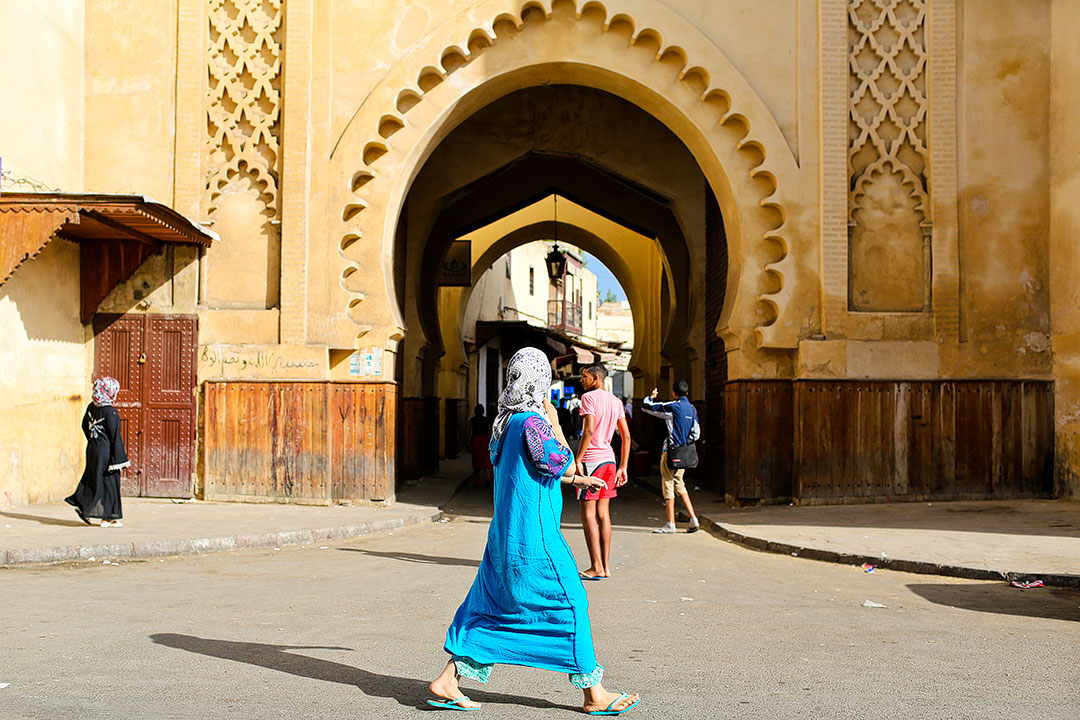
2. Currency and Cost
More established shops will take credit cards, but most smaller markets, street vendors, and cabs will not. Be ready with the local currency.
The Moroccan Dirham (DEE-rahm) goes for roughly 10.4 Dirhams (DH) per 1 USD or 11.09 per 1 euro. We thought things would be cheaper in Morocco, but the prices were comparable to Europe because of how touristy the country has become.
Our guide recommended that each person exchange 100 euros daily, which was plenty for us.
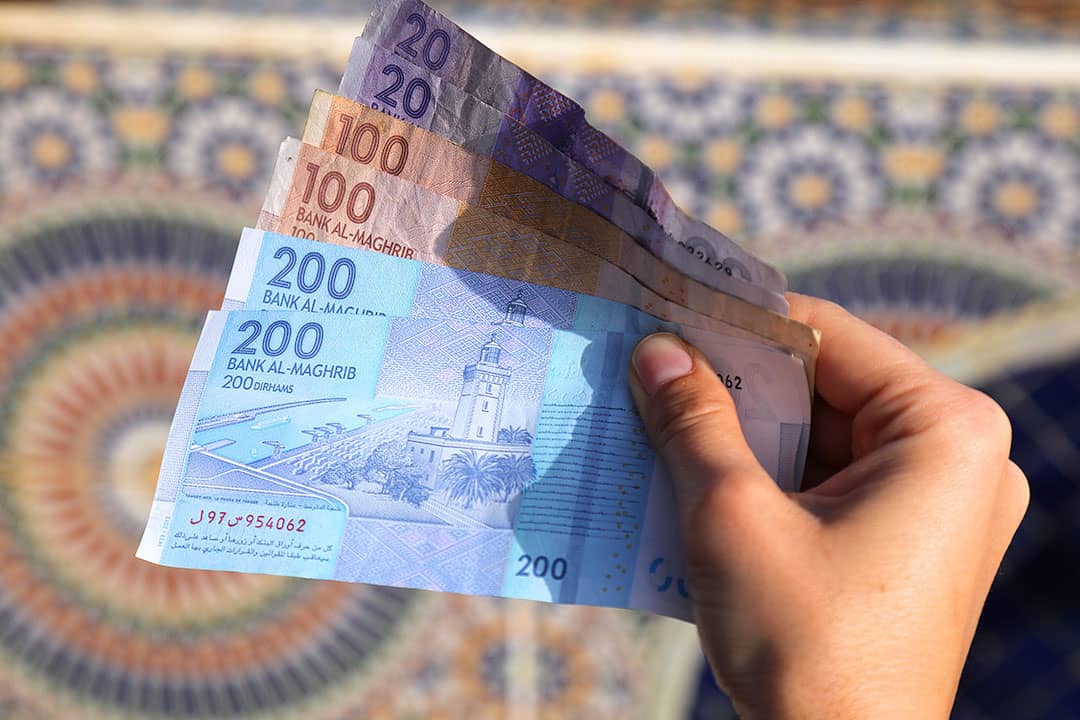
3. ATMS Can be Hit or Miss
Exchange enough money when you get your chance. Ask the front desk at your hotel; they may have money to exchange.
The ATM quickly ran out when our entire group was trying to exchange money. Who knew ATMs can run out of money!
A few people from our group thought the ATM was giving an error and tried multiple times, but the ATM didn’t dispense any while still charging it from the bank for every attempt.
Also, traveler’s checks are pretty much useless in Morocco. It’s hard to find a place to cash them.
4. Keep Correct Change with You
Moroccan cab drivers rarely “have change” when you need it. At least, that’s what they tell you. To avoid overpaying, keep your coins.
Most of our cab rides within the city cost roughly 30 Dirhams. The dilemma with keeping change though is that you will not be able to exchange it back when leaving the country since they only want larger bills.
You want to keep correct change while you’re in the country, but you also want to spend it all before leaving.
5. Learn to Haggle
If you’re shopping in the markets or medinas, you will have to learn to haggle. I know some people have strong opinions about paying full price for the sake of “charity”, but selling is like their national sport and haggling is an integral part of their culture.
More likely than not, they will still get the better deal, but keep in mind if you are willing to spend the time, you can get items for at least 25-50% of the starting price.
Know what you’re willing to pay before you start the haggling process and walk out if you can’t get the price you want. They may call you back multiple times.
Also, you may want to bargain with your cab drivers before getting in. Most of our rides within the city cost 30 DH. If they demanded more, our guide told us to hand them the money and walk away.
Luckily, that didn’t happen to us because we always firmly set a price before the ride.
If you’re looking to buy a carpet or anything with a higher price tag, do your research before visiting Morocco. People get tricked into buying them as “an investment” to sell later. Don’t fall for their sales tactics and the local guide’s added pressure to buy.
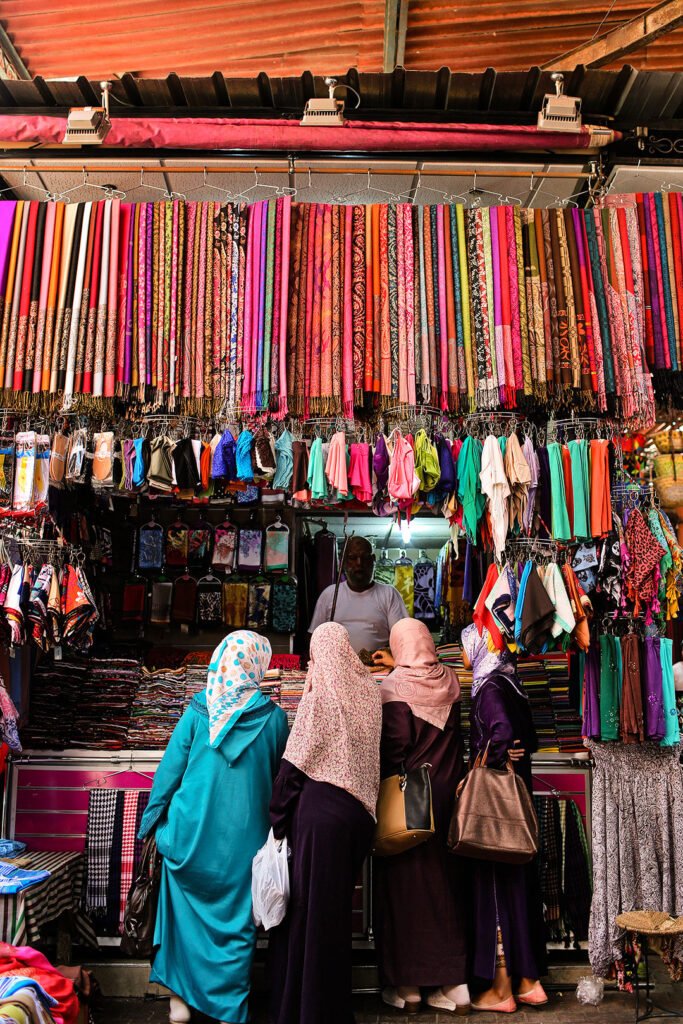
Have some change ready for tips. A good general rule of thumb is 1 DH at a local place and 3-5 DH at nicer places.
7. Be Wary of Local Guides
You should absolutely hire a local guide to help you get an inside perspective on the country and navigate through the maze of the medinas (old towns). However, be sure you know what you’re getting yourself into.
The local guides have built relationships with many different stores, and they are most likely getting a cut of the sales. Don’t be fooled when they say they are trying to help you haggle to get the best price, because they usually aren’t. We were able to get better prices without them. This happened in Fes.
See More: 21 Amazing Things to Do in Fes Morocco
8. Stay Away from Strangers Offering Free TOurs or Directions
Even if you don’t hire a local guide, you might find other locals offering you tours while you’re walking around the markets and medinas.
If you go with one of them you may end up completely lost and pressed to spend money. Most of the time they will ask for a tip afterward too.
This is the same with asking for directions. A lot of them will offer to walk you to where you’re going but then ask for a tip. If you’re so inclined, always keep money to pay them off, plan ahead and ask your hotel, or pull up some maps when you have WIFI.
Also, if you are renting a car in Morocco so that you can get around on your own, be sure to plan ahead rather than wait until you are there.
9. Fridays are Holy Days and Prepare for Holidays
Keep in mind that it is a Muslim country, so pay attention to their holidays otherwise you might be there when everything is closed.
Also, most shops and attractions will close on Friday since it’s their holy day.
A friend of mine went during Ramadan and told me it was very difficult to eat meals. We happened to arrive in Morocco on Eid al-Adha, where they were slaughtering and sacrificing animals on the street.
All shops we saw closed that day and most shops were closed the following day.
Plus it was a bloody mess, most of which we avoided. Below you can see what is usually a crowded marketplace is deserted.
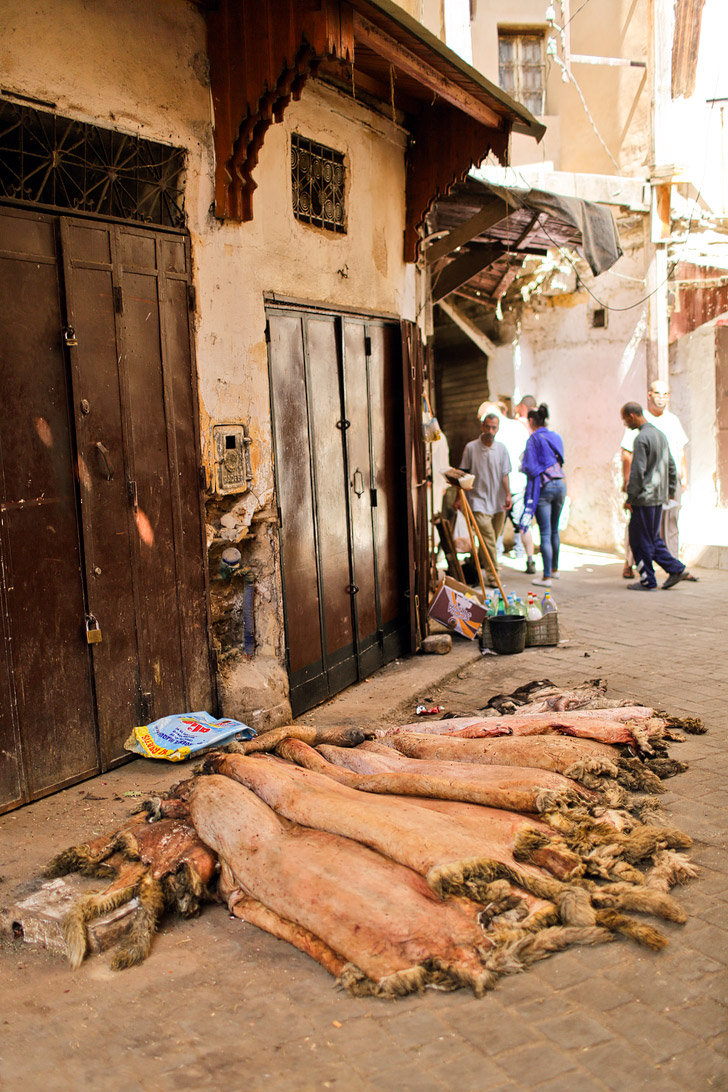
10. Be Careful what Water You Use
To stay safe, drink bottled water and even use it to brush your teeth. Also, avoid using any ice when you’re out. The LARQ Self-Cleaning Water Bottle is really useful when you’re in Morocco if you don’t want to buy a ton of bottled water. See all the top travel water bottles we tested on the road.
11. Pack Some Imodium
I don’t care how strong you think your stomach is, you should pack some Imodium just in case. This is always a good rule of thumb for all travel.
At least a third of our group wasn’t feeling well after the first meal in Morocco. I popped a couple of Imodium, and I was fine the next day. Others were not so fortunate.
See More: 21 Moroccan Foods You Must Try
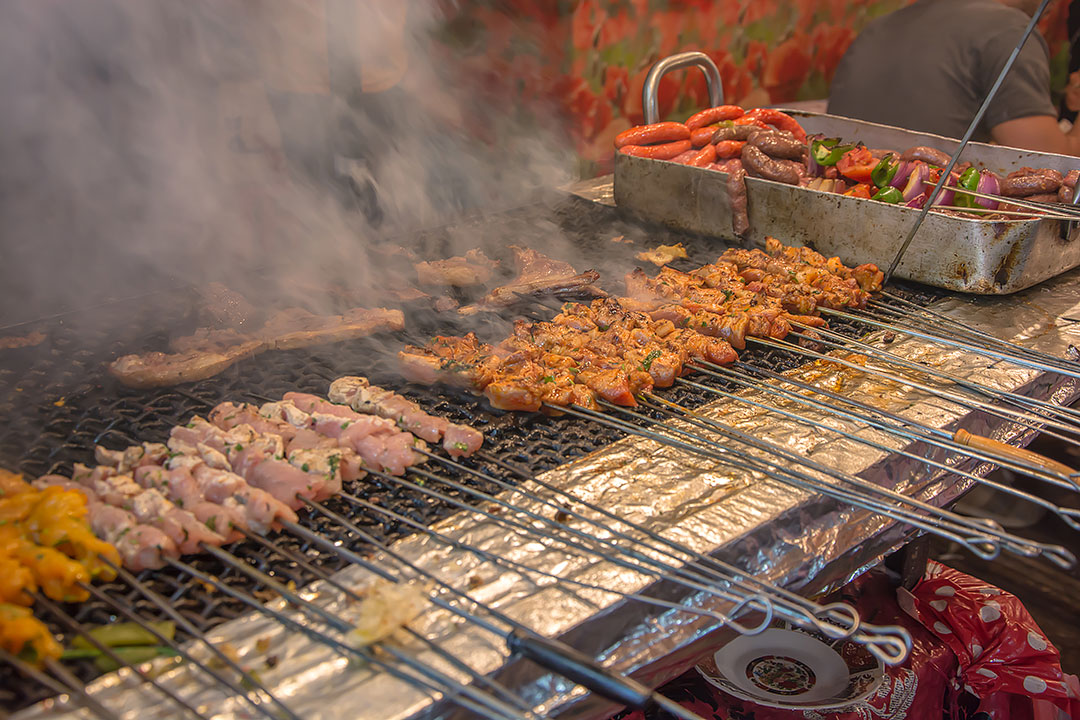
12. Watch Your Pockets
Most Moroccans are friendly and honest, but you should always be careful with pickpockets in any major city, especially in crowded places like the markets. Pickpockets often target touristy areas.
13. What Language Do they Speak?
Moroccans speak a mixture of Arabic, Berber, English, and French. You’ll be fine with English in most of the larger cities, but you’ll probably need a translator in the rural parts of the country.
Here are a few basic Arabic words that came in handy:
- Hello (Peace Be With You): Salam Alikome (salaam a eleikum)
- Thank You: Choukran (shokran)
- No Thank You: La Choukran (la shokran). This one is useful when you have a bunch of street vendors hassling you to buy something.
- Watch Out: Balak. Although you won’t use this yourself, you’ll most likely hear this in the medinas or souks (outdoor markets). Locals will say balak if coming by with a mule, motorcycle, or cart to warn you to either get the side or get run over.
14. Visiting Mosques
If you’re hoping to see a Mosque while visiting Morocco, you might be out of luck unless you’re Muslim. Most mosques are off-limits to non-Muslims, with the exception of the massive Hassan II Mosque in Casablanca. They are still beautiful to take photos from outside though!
If you’re looking for beautiful architecture, Bahia Palace is open to visitors.
See More: 21 Fascinating Things to Do in Marrakech Morocco
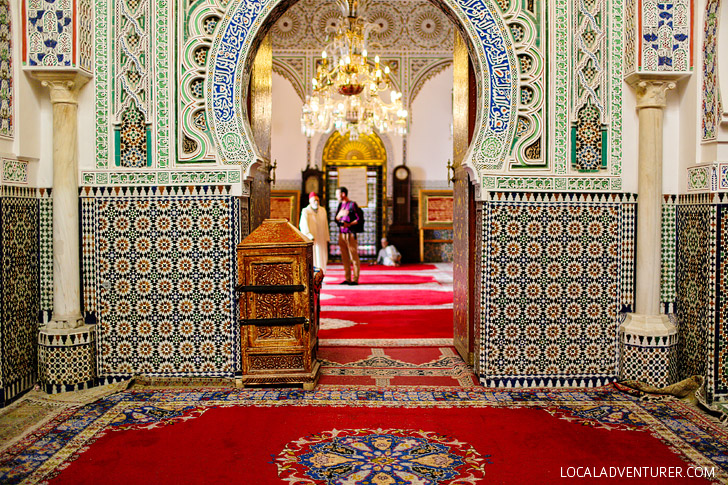
15. Alcohol, Drugs, and Parties?
Although most Moroccans are Muslims, yes, they still have all these. Hashish, an extract of the cannabis plant, is quite commonly offered to you in the streets.
Contiki loves their parties, and we were told that only hotel bars had alcohol available for tourists, but we surprisingly found several bars and even nightclubs serving alcohol.
We decided we didn’t want to pay 300 DH (30 euros) to get into a club that already appeared like a sausage fest from the outside.
They also told us it’s pretty typical for prostitutes to hang out at nightclubs there too. There was a special DJ guest that night, but normally the club was supposed to cost around 150-200 DH.
16. Do I need a Visa or Vaccines?
Almost all English-speaking countries (except South Africa and Australia) do not require visas to enter the country. The CDC also doesn’t require any vaccines although many would recommend Hepatitis A and Typhoid shots. Find out more details from CDC here for the most updated information on vaccinations before visiting Morocco.
17. Have the RIght Converters
Don’t get stuck in Morocco without a way to charge all your electronics. We recommend picking up one of these so that you have options for wherever you travel and additional outlets in case there aren’t many in the hotel room.
Morocco uses the following: Voltage: 220 V, Frequency: 50 Hz, Power sockets: type C / E. If you have something that works in Europe, then it will be the same. If you’re traveling from the states, the adapter will help you get everything charged.
18. Ask Before Taking Photos (And You may have to Pay)
When you’re walking through the markets, be careful when taking photos of people and shops. Unless you are purchasing something, they may get angry at you and even demand money for the photos.
When we took photos of the snake charmers, we paid 20 DH. Some may even hassle you for more, so again, it’s good to first establish a price before taking a photo.
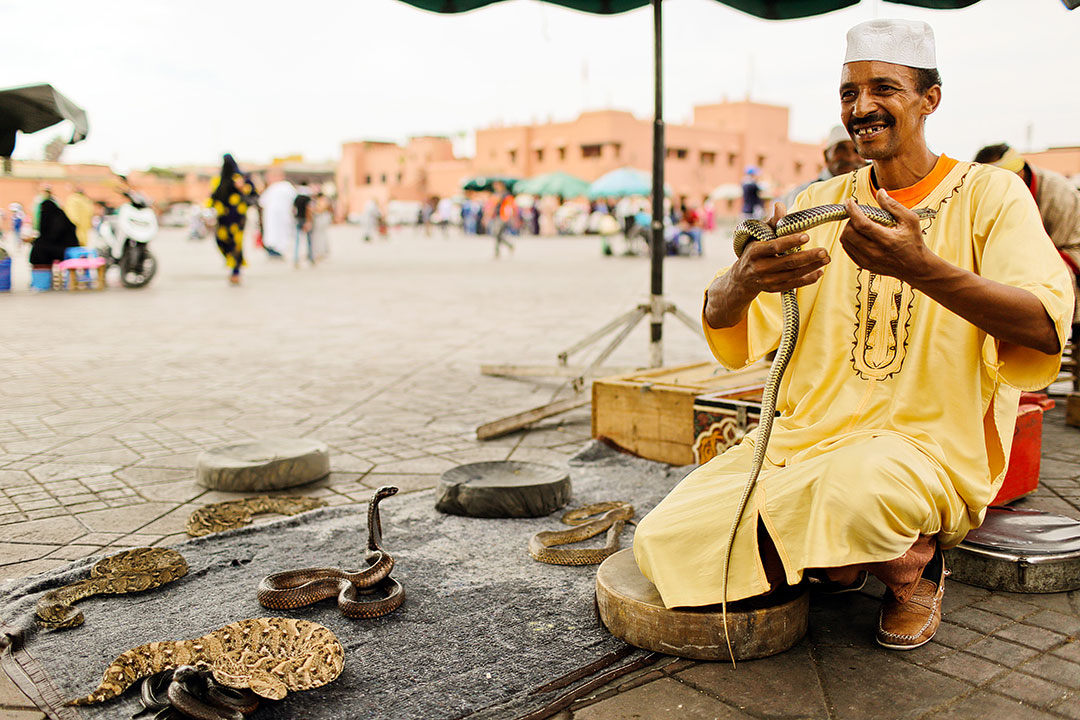
19. Bring TOilet Paper with you Everywhere
Don’t expect bathrooms to have toilet paper. Be prepared with your own and also have some hand sanitizer available. A lot of public restrooms have a small fee as well so if you see an attendant be sure to ask the price before using the bathroom.
Though they’re not flushable, I like to bring my wet wipes on all my trips to wipe my hands when I don’t have easy access to bathrooms.
20. Souvenirs to Bring Home
Fez is known for leather and carpets, while Marrakech is known for fragrances, oils, and spices (like saffron). If you’re buying saffron, make sure you’re buying the real thing. Many places sell artificial saffron for dirt cheap or mix the real with the fake stuff. No one wants saffron cut with other spices.
You can ask them to do a demonstration in water. If it colors the water yellow, it’s real, if it turns reddish, it’s the dye coming out from the artificial saffron.
You can also smell the difference (should smell more herbal), or ask for a couple of strands to put in your mouth and spit it onto a tissue to see what color it produces.
21. It’s a cat Lover’s Heaven… and Hell
There are homeless cats everywhere in Morocco. They are super cute and made us smile every time we saw them but also really sad every time we had to walk away and leave them.
It seemed that the people of Morocco took care of them in their own way. We saw them feeding them scraps of food in the markets. If you’re highly allergic to cats, don’t forget to bring some allergy meds with you.
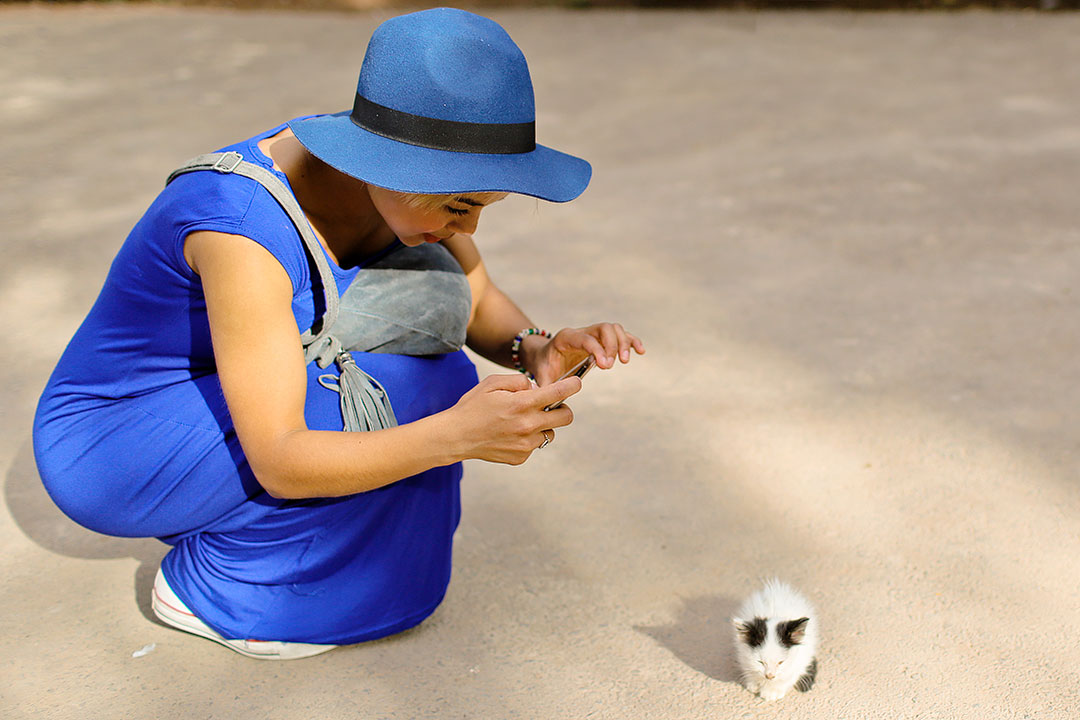
Final Thoughts as a Woman Visiting Morocco
There were many times on our trip that I genuinely wished I was a man visiting Morocco. While others simply got annoyed (full disclosure), I was much more sensitive since I still have residual resentment from some sexual traumas when I was younger that I am working out.
It’s a work in progress, making the trip incredibly challenging personally. For the most part, we had the best-case scenario of traveling with a local guide and Contiki. Those incidences happened within the few hours of free time that we wandered off alone.
Overall, Morocco is beautiful, and we’re happy to have experienced the country.
Instead of scaring you from visiting, we hope it educates you and helps you go in with the right mindset and expectations. As long as you’re entirely aware of your surroundings and know what to expect, you can have a wonderful experience.
- Get comprehensive insurance for your trip.
- Find a great deal on Morocco hotels .
- Arrange a rental car for your trip.
- Book a tour for your visit.
- Get airport lounge access .
- Buy a travel charger to keep your devices charged.
- Get a new backpack for your trip.
- Buy a Morocco travel guide .
- Pack the appropriate shoes for your trip.
- Don’t forget your in-flight essentials .
- Lonely Planet Morocco – they always have great photos and information.
- Moon Morocco – also very photo heavy.
- Morocco National Geographic Adventure Map
- Pocket Arabic Dictionary
Is Morocco one of the top places you want to visit? Why or why not? Can you think of any other tips for visiting Morocco?
Did you enjoy this post? Pin it for later
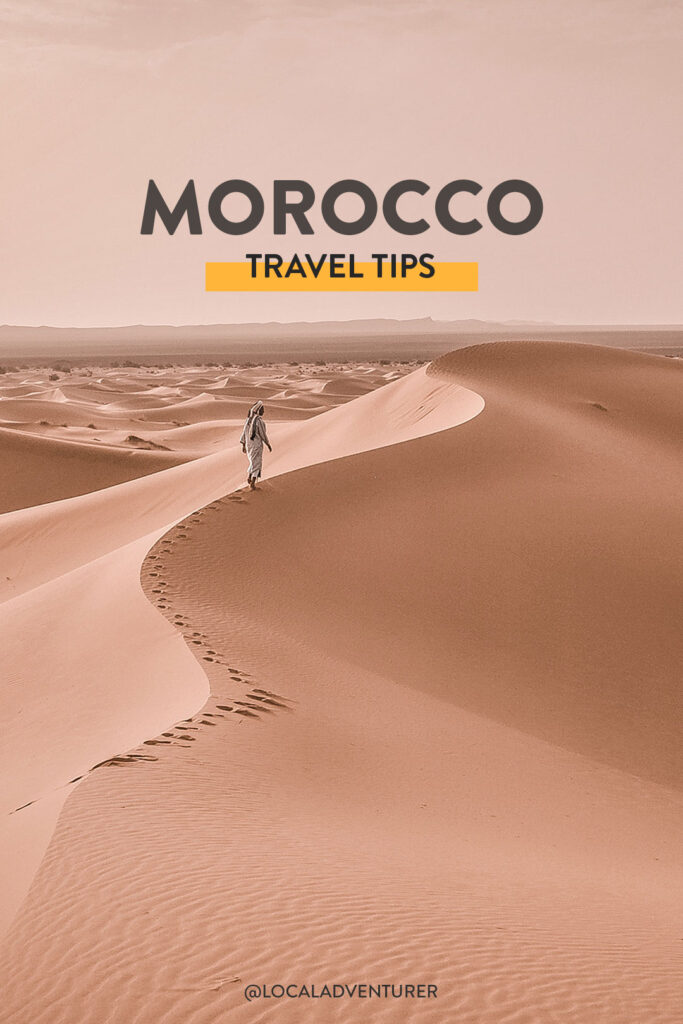
SEE More International City Guides
GALAPAGOS ISLANDS
KYOTO, JAPAN
LONDON, ENGLAND
MANCHESTER, ENGLAND
MELBOURNE, AUSTRALIA
NEWFOUNDLAND, CANADA
PARIS, FRANCE
PORTO, PORTUGAL
QUEBEC CITY, CANADA
REYKJAVIK, ICELAND
TOKYO, JAPAN
“Discovery consists not of seeking new lands but in seeing with new eyes ” – M. Proust

Esther + Jacob
Esther and Jacob are the founders of Local Adventurer, one of the top 5 travel blogs in the US. They believe that adventure can be found near and far and hope to inspire others to explore locally. They explore a new city in depth every year and currently base themselves in Las Vegas.
Follow on Instagram (E + J) , YouTube , TikTok , and Pinterest.
This Post Has 33 Comments
I’ve been to Morocco 3 times. Tangier and twice to Agadiar. Guess what IM A WOMAN and had the most amazing time in both areas. In Tangier we visited the Casbah which was amazing. Haggling was fun and the people are great. Never felt vulnerable and I have not been insulted or felt afraid. On the most part the people are really nice. I absolutely love Agadir. Its modern in its approach and there’s loads to do. The beach is beautiful. As two women travelling without a man, oh who’d of thought, we did not have any issues in Morocco anymore than anywhere else. Wherever there’s men they’ll be the ones who are rude, sexist and revolting. That’s unfortunately the way some of them are. Otherwise the people of Morocco are lovely. I’d go every year if I could afford it.
That’s so great to hear you had a wonderful experience! I’ve definitely heard a mix of thoughts from both sides.
Thanks for your list of tips. I’m a bit conflicted about Morocco due to my serious feminist leanings, but I so want to see it. It’s a shame that there is such disrespect and hypocrisy, but I suppose that’s everywhere in some regard. ;-)
You’re welcome, Hillary. I still hope you get to experience all the good parts of Morocco. I think it’s definitely changing with the younger generations, but it really is a different world view over there.
as local Moroccan, I can confirm that the tips that you provide are true. I am ashamed of the ‘Watch Your Pockets’ tip; what can I say?! every place have it’s good and bad people. however, by mentioning that you are making people aware so that they don’t have any bad experiences in Morocco. thank you :)
I think it’s true for most big cities in the world. :) Thanks Abdou!
Hi I’m Indian live in dubai UAE I like to visit Morocca it need visa or not I’m hear with residents visa
Great article. My friend is currently in moroco and hates it. I hope that she gets home safely and isnt raped. I am never going to visit! I will stick to places like Finnland, Switzerland and new Zealand
Stay safe everyone!
dont forget that you can be beheaded if you backpack in the countryside :)
I did not hear about that!
Thank you realy Marrakesh is very nice
So glad I found this! I booked today for me and my partner to go next year. Great to have an idea of what to expect.
So glad you found this helpful, Donna. I hope you two have a great trip!
Such a detailed insides about morocco, a great read to be aware before going to morocco, I have some more insights in depth. If you want to read.
Thanks for the information, yes I agree that before visiting In Morrocco we must know about the details of that places. When I had visited that place I don’t know anything about that place but my journey was very interesting and beautiful. The natural beauty also attracts me a lot.
Glad you found it useful, Diana!
Thank you for being so detailed. Your blog is wonderful and very insightful. I will use it in future travels. Thank you for including pictures.
Thanks so much for reading, Madison!
Wow…such an amazing experience feeling happy while visiting Morocco. Basically, in time of our trip we visited local market bought many products. Thanks to our local guide from yougomorocco.com planned a trip in a perfect way. I hope I will plan this place in an upcoming year.
Thanks for such an informative blog! I would love to travel to Morocco, and in fact, almost booked a trip, but decided to go elsewhere instead due to time constraints. Thanks for the advice to get out of the cities and explore more.
thanks for sharing the valuable info for Morocco visitors !!
I’m planning to visit Morocco with my boyfriend in March. But I’m a bit skeptical. Will I be safe in Morocco
My daughters middle school is deciding bet Morocco & Brazil. there will be at least a minimum of 20 middle schoolers with parents, The trip will be next April 2018. Im worried either way on what they can do
I feel like as long as there are parents watching out for them, they should be okay. It’s unfortunate to say, but it helps if the parents are male. Our tour guide was telling us they previously sent a female guide who didn’t fare too well in the country.
Very informative write up. I appreciate your work. I will be visiting Casablanca on official note in a weeks time just for two days. I hope the experience will be great! However, you did not mention what the cost of various hotels are like.
Thank you so much.
I’m moroccan and I have been there like 5 times I think but everything you said is true. It’s good you’re being honest about it. Morocco is good but it’s not perfect.
Thanks for your comment. If you think about it, no country is perfect. I’m sure plenty of people have gone and had different experiences too, so it’s best seeing it for yourself. :)
Very informative. Thank you for being so open and honest. I still want to visit Morocco and now have a good idea as what to.expect, especially as a woman.
Thanks, Suzy! You absolutely should! :)
Thanks, I will be in morocco in July, really helpful tips, Choukran :) regards Ayaz
You’re so welcome! Have a great trip :)
How I can trip to morocco is there any cheap morocco holidays packages ? My friend suggest me this website http://www.viriksonmoroccoholidays.co.uk is this good ? i find this website have very affordable packages but I am confused because of fraud.
Unfortunately we’re not sure about that company since we’ve never been. The only experience we have in Morocco is with Contiki, which we had a great time with! Good luck!
Leave a Reply Cancel reply
This site uses Akismet to reduce spam. Learn how your comment data is processed .
Do I need a visa for Morocco?

Travellers from many countries do not need a visa to visit Morocco for a period of up to 90 days. Currently, citizens of Australia , New Zealand , the USA , the UK , the EU and Canada , among many others, do not need a visa to travel to Morocco, provided they have a passport of usually six months' validity and an onward or return ticket (with supporting documents). However, some of these countries, while not needing a visa, need to obtain an Electronic Authorisation (AEVM). These countries include Congo, Guinea and Mali.
If you do need a visa, you can submit an application either electronically or via your nearest Moroccan embassy/consulate/visa centre. However, regardless of whether you need a visa or not, ensure that your passport is stamped when you arrive in Morocco, as you may have difficulty leaving the country if your passport does not have an entry stamp.
Applying for a Moroccan tourist visa is relatively easy and straightforward and can be done in two ways; either online (depending on your nationality) or via your nearest Mexican embassy or consulate. If you're eligible to apply for it online, you'll need the following documentation:
passport with at least 3 months' validity
recent passport-sized photo
email address (that's checked regularly)
debit or credit card to pay the visa fees
Once your e-visa is approved (which generally takes a couple of days), it'll be sent to your provided email address in a PDF format. While you don't have to have a physical copy as well as a digital one, it's advised you print out a copy of your visa to avoid any disruptions.
If you aren't eligible for an e-visa, you'll have to apply at a Moroccan embassy/consulate/visa centre and this may require you to present further documentation. This documentation could include:
passport with at least 6 months' validity
travel plans including a return flight
proof of finance (bank statements)
itinerary information (accommodation reservations)
Visas usually don't take that long to be approved but we recommend starting the application process as soon as you know you're going to Morocco to avoid disruptions to your travel plans. Once you've paid the visa application fee (around DH 220 or USD$23) and your visa is approved, you can stay in Morocco for a period of up to 90 days.
This page is for general information only and may be subject to change. It is your responsibility to obtain relevant visa and travel information required for entry, departure and travel to each country or region you visit on your trip. You should confirm these with the relevant embassies and/or consulates.
Last updated: 15 June 2023
Let's create an exclusive trip for your group.
My experience in the Sahara as a disabled traveller
Best places to travel in February
Best places to travel in April
Best places to travel in November
Explore these 7 tea rituals from around the world
The 7 best places to go on a hot air balloon ride
This Moroccan artist is making space for local creativity to thrive
Morocco’s High Atlas Foundation is bridging communities by growing trees
Cookies on GOV.UK
We use some essential cookies to make this website work.
We’d like to set additional cookies to understand how you use GOV.UK, remember your settings and improve government services.
We also use cookies set by other sites to help us deliver content from their services.
You have accepted additional cookies. You can change your cookie settings at any time.
You have rejected additional cookies. You can change your cookie settings at any time.
Warnings and insurance
Before you travel.
No travel can be guaranteed safe. Read all the advice in this guide. You may also find it helpful to:
- see general advice for women travellers
- read our guide on disability and travel abroad
- see general advice for LGBT+ travellers
- read about safety for solo and independent travel
- see advice on volunteering and adventure travel abroad
Travel insurance
If you choose to travel, research your destinations and get appropriate travel insurance . Insurance should cover your itinerary, planned activities and expenses in an emergency.
About FCDO travel advice
The Foreign, Commonwealth & Development Office ( FCDO ) provides advice about risks of travel to help you make informed decisions. Find out more about FCDO travel advice .
Follow and contact FCDO travel on Twitter , Facebook and Instagram . You can also sign up to get email notifications when this advice is updated.
Related content
Is this page useful.
- Yes this page is useful
- No this page is not useful
Help us improve GOV.UK
Don’t include personal or financial information like your National Insurance number or credit card details.
To help us improve GOV.UK, we’d like to know more about your visit today. Please fill in this survey (opens in a new tab) .

IMAGES
COMMENTS
Ensure your accommodation is insect-proof. Waterborne, foodborne and other infectious diseases are common. Boil drinking water or drink bottled water. Avoid raw or undercooked food. Avoid black henna temporary tattoos. These often contain a dye that can irritate the skin. Full travel advice: Health.
Travel advice. To help Australians avoid difficulties overseas, we maintain travel advisories for more than 170 destinations. Smartraveller - travel advice; ... Australia and Morocco maintain positive bilateral relations, including in the areas of trade, agriculture and joint efforts to counter terrorism and violent extremism. ...
Check the Morocco Travel Advice & Safety ... Australia-Morocco Alumni Network. 06 September 2022 - The Embassy has established the Australia-Morocco Alumni Network (AMAN) with the purpose of connecting with Moroccan alumni who are currently or have studied in Australia, and with Australians who are currently or have studied in Morocco. ...
Stay safe with the latest travel advice. Everything you need to know before you go. Search Smartraveller. Search. Browse destinations. ... 1300 555 135 from within Australia. For how we can help you overseas see the Consular Services Charter. Enquiries and feedback. For non-urgent enquiries, ...
For the most up to date requirements for entry into Australia, go to Smartraveller. Please click this COVID-19 Travel Regulations Map (IATA) to view the latest Morocco COVID travel requirements. ... Get Morocco travel advice. Travelvax is a specialist provider of travel health advice and medical services for those travelling overseas.
Morocco Travel Advice travel documents: passport. A passport is a transport document delivered by the government of your country. ... the US, Canada, Australia, and New Zealand will be able to visit Morocco easily. However, visitors from other countries might have to meet extra conditions, like showing proof that they have been vaccinated ...
For non-urgent enquiries, you can email us at [email protected]. This email address is monitored during our business hours only. If your enquiry is urgent, you can contact us on +212 5 37 54 33 66. For urgent consular enquiries outside of our business hours, you can contact the Australian Consular Emergency Centre.
Australian Government travel advice for Montenegro. Learn more about local safety, laws and health risks. ... Morocco. Updated: 12 Apr 2024. Overall advice level: Exercise a high degree of caution. Australian Government travel advice for Morocco. Learn more about local safety, laws and health risks. ... 1300 555 135 from within Australia. For ...
A Guide to Traveling from Australia to Morocco: Tips, Flights, Costs. In this Guide to Traveling from Australia to Morocco, you'll find tips on finding flights, calculating costs, transport, accommodations and what to expect as an Aussie visiting Morocco. ... visiting this North African jewel requires considerable long-haul travel. However ...
Morocco is a safe country to travel to as long as you understand its laws and cultural customs and adhere to the status quo. Its crime rates are relatively low but be aware of scam artists and pickpockets which can be common. Morocco has seen a huge rise in foreign visitor numbers in recent years, as many tourists are looking for an adventurous ...
Travel advice and tips for visiting Morocco. From safety concerns to budgeting and choosing the best time to visit, there are several aspects to keep in mind when creating your itinerary. This guide is a combination of Morocco travel tips from our travel experts to answer your questions about this North African country. ... Australia, New ...
American citizens traveling to Morocco need a valid passport at the time of entry and departure. However, they do not need a visa if they stay in the country for less than 90 days. Please note that you'll need one page of your passport for the entry stamp, so make sure you have enough space. Additionally, the export of Moroccan dirhams is not ...
1300 555 135 within Australia +61 2 6261 3305 from anywhere in the world. Read more about getting help overseas on Smartraveller. Travel advice. We maintain travel advisories on Smartraveller for over 175 destinations, assigning an overall advice level to each. The advice levels reflect the risks for Australian travellers in each destination.
One bottle of spirits and one bottle of wine. 150ml of perfume and 250ml of eau de toilette. Gifts to the value of USD $200. The following are banned from being imported in to Morocco: firearms and ammunition, narcotics, absinthe, immoral publications, and plants and plant products considered a threat to national flora.
9. Things to know before going to Marrakesh. Marrakesh is the most popular city in Morocco for visitors, so pre-book entrance tickets to major attractions such as Jardin Majorelle and Musée Yves Saint Laurent online to avoid waiting in line. The Marrakesh medina comes to life around 5 pm, but the "pink city" is more than just the medina - spend time exploring Gueliz and step off the main ...
Level 2 - Exercise a high degree of caution. Level 3 - Reconsider your need to travel. Level 4 - Do not travel. It's important to read and understand the advice level for each country you're travelling to or through. The advice level can affect your safety and your travel insurance.
If you're looking to buy a carpet or anything with a higher price tag, do your research before visiting Morocco. People get tricked into buying them as "an investment" to sell later. Don't fall for their sales tactics and the local guide's added pressure to buy. 6. Tipping. Have some change ready for tips.
Morocco Travel Advice for Australian travellers. We keep abreast of the latest travel advice to Morocco and follow advice as set out by the Smart Traveller. Safety of our travellers is paramount and we recommend that you check the latest travel updates from Smart Traveller before you fly. Flying to Morocco from Australia:
Travellers from many countries do not need a visa to visit Morocco for a period of up to 90 days. Currently, citizens of Australia, New Zealand, the USA, the UK, the EU and Canada, among many others, do not need a visa to travel to Morocco, provided they have a passport of usually six months' validity and an onward or return ticket (with ...
Australian citizens do not need a tourist visa when travelling to Morocco in 2024. Australian passport holders can stay in Morocco for a short period of time (for 90 days). Please, read all the information below to make your trip easy and safe. Don't rely on information from only one source. Please, with at least one more source listed in the ...
Australia tourist visa from Morocco. Moroccan citizens can apply for a visa online when travelling to Australia. The Australia tourist visa is also known as the Australia 600 Visa. Applicants are required to be present when applying for the Australia eVisa. This tourist visa typically allows a short term stay. The Australia tourist visa remains ...
The Foreign, Commonwealth & Development Office (FCDO) provides advice about risks of travel to help you make informed decisions. Find out more about FCDO travel advice. Follow and contact FCDO ...